#covid affected filming and knowing what happened over the summer in the world
Text
finding out that the job application the writers put on dean’s desk is so distressing???? i’ve watched the first season and there’s just no way from where the show started that dean would want to be a cop??? that finale is such a mess
#spn#belle eve speaks!#covid affected filming and knowing what happened over the summer in the world#making dean suddenly want to be a cop is so tone deaf#im convinced the showrunners are bigots#in every sense of the word#homophobic misogynistic racist ableist#you name it#god this fact makes me so upset#fantasy shows just shouldnt be allowed to display hate crimes#yal are fighting ghosts for crying out loud#dean winchester
11 notes
·
View notes
Text
Great comprehensive interview with Elvira on the making of The Letter Room and filmmaking, in general. One interesting tidbit mentioned: she is currently developing a podcast about sex. 👀🤔

For most of her creative life, Elvira Lind has been behind the the lens compassionately capturing true stories as a documentary filmmaker. Her debut feature, Songs for Alexis, observes two young lovebirds navigating a long distance relationship and challenging views on gender identity in the modern age. While her sophomore feature, Bobbi Jenne, explores the life of a famous dancer fighting for her own creative and personal independence.
Despite her prolific doc work, a story that couldn't simply be told in its raw form kept circulating in her head: a dark prison comedy about the secret life of a correctional officer trying to bring humanity to the prison system. When he gets transferred to a job in the letter room, he finds himself a little too involved in the private lives of the inmates.
Far along in her second pregnancy, and with the support of an incredible team of collaborators, Elvira took on the challenge of writing and directing her first narrative short, "The Letter Room." The film stars Oscar Isaac and Alia Shawkat, and has had an all-star festival run, screening at Telluride, Tribeca, and the Palm Springs International Film Festival. Here, Elvira reflects on the joys and challenges of creating your first short film—putting empathy first, reshaping the tropes around pregnancy, and screening in the COVID era.
vimeo
FTW: How did you become a filmmaker?
Elvira Lind: I’ve always loved film. I was very drawn to documentaries because it felt like you were entering something that was really happening. You opened a door and were already inside the film. You’re just trying to keep up with what’s being thrown at you. As opposed to fiction where you have to conjure it up from nowhere. I loved imagining and writing stories when I was little, but I didn’t have the confidence to pursue it.
I didn’t come from a family of filmmakers. And I came from a time when people had a little shitty camcorder that you borrowed from someone’s uncle, and buying film was expensive. Things opened up and changed a lot when cameras became more accessible.
I could only afford one year of film school in Cape Town, where I met some amazing people and learned about so many different ways of storytelling. I came back to Denmark and found myself working for free a lot for other filmmakers while doing a side job. The paid work was very hard to get, but I’d rather work for free with filmmakers that I loved and have more responsibilities than have access to nothing. It wasn’t easy to find my way in, but it’s so worth it.
And now you live in New York. How does this global background affect your general filmmaking style and approach?
I definitely bring a lot of Danish documentary traditions with me and hold it very dear. There are a lot of kick ass female documentary filmmakers in Denmark that have taught me a lot. There’s a good support system for women there. It’s an incredibly privileged place in that there’s funding from the government to make films. You can make things that, in my opinion, are often far more interesting because it’s not reliant on how it’s going to make money in the box office.
You’ve shot many of your documentaries in the past. So what was it like this time to be working with a cinematographer?
I always wanted to work with a cinematographer on my documentaries; we just couldn’t afford it. Now for “The Letter Room”, I worked with Sam Chase, who has got such a brilliant eye and it was wonderful to have someone to work with on composing the look of the film because I’m usually doing it by myself. It is kind of like a marriage. I work with the same editor on all my projects as well. You enter this symbiotic sort of dance together. For me, it also means you have to fight about things and disagree and then make up and hear each other out. My editor, Adam Nielsen, is the kind of guy who just comes up with genius ideas while in the shower or on the way home from work on his bicycle. You have to find these key people in your life where you can bounce ideas back and forth with.
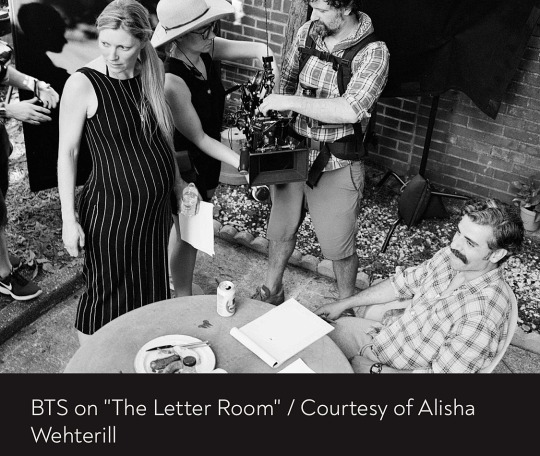
Where did the idea for “The Letter Room” come from?
It was a story that was brewing in my head for a long time, but I wasn’t sure how to put a narrative film together. I just started to write it down and then it kept developing.
There was a podcast that I listened to that really inspired me. It told the story of different men who were all unknowingly writing love letters to the same woman. She started to ask for money and help with rent, but the letters she wrote were so wonderful and all these men were very in love with her. These very lonely men felt like magic had entered their lives. They all eventually found out that the woman was actually a man writing to different people trying to get their money. They were all heartbroken, but one of the men said that the worst part was losing these letters and that the fantasy was gone. He wished they could just keep writing to each other. So much of life is fantasy and trying to live through other people’s lives. I’m very drawn to stories of loneliness and bottled up feelings.
And then I am firmly against the American prison system. It’s heartbreaking, frustrating, and I can’t make sense of it. How do you even begin to explain this system to a child?
It’s a society that doesn’t care about humanity. I wanted to show the monotony, the repetition, the sadness. I don’t see the bigger goal or purpose of locking people away for countless years and taking away all the things that makes you feel human, that makes life joyous. I really believe that we can all change and this system teaches people nothing. “The Letter Room'' is the combination of these two concepts that I’m very passionate about.
And then I got pregnant for the second time and I hadn’t made a film between the two. It was a crazy feeling to be taken over again by pregnancy. A wonderful friend of mine, Sofia Sondervan-Bild, came to me and said, “I think you should make this film and I’ll make it with you.” Initially, I freaked out and thought I didn’t know how to do fiction and doubted how I could make a film in a prison, but she inspired me and told me to do it. She’s just one of these incredibly powerful people that you want to go on an adventure with. She made me feel like my pregnancy wasn’t going to stand in the way of me making this film. We ended up shooting while I was far along in my pregnancy in a prison in the middle of a summer heat wave. It was crazy, but it was the best thing that I could’ve done at the time.
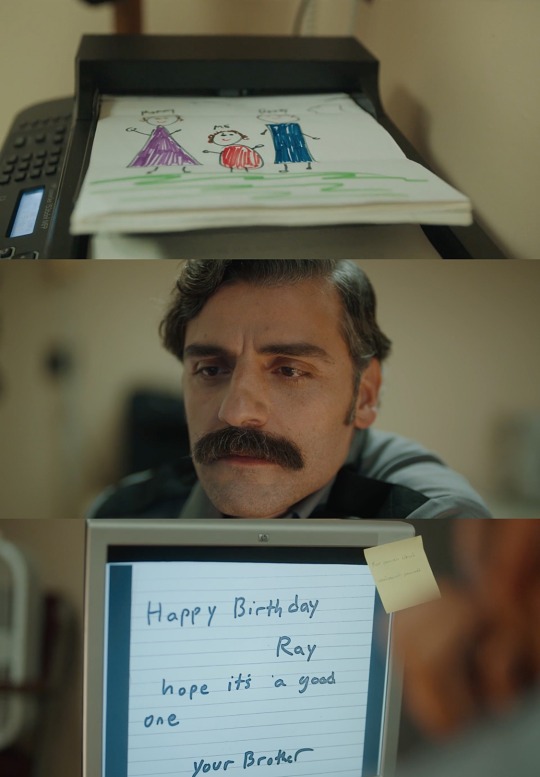
When you were directing on set at that stage of pregnancy, did you feel like you were reshaping tropes of what women are capable of?
It was insane. The funny thing was that the crew was like, “we can’t complain that we are tired because she is extremely pregnant and still running around.” I was so high off of that experience. When we finished, I collapsed. I fell straight onto the couch and then I have a two and a half year old screaming my name. That was more work for me than directing the short. I edited the film right before I gave birth actually, and then I gave birth and did sound right after. I was pumping breast milk in the corner in the darkness during the sound edit.
I’ve learned a lot from surpassing whatever I thought was physically possible with being pregnant. I learned that being in a creative process gives you so much energy that it allows you to be in whatever shape, size, form, mental space you can. People are ready to give you their support, if you choose the right people. I’m really grateful that I chose such wonderful collaborators who supported me through it all. Even when people were questioning my choice to direct a film while being pregnant in a prison. Why not? Women get pregnant and then we still need to be supported so that we can continue to make the things we want to do.
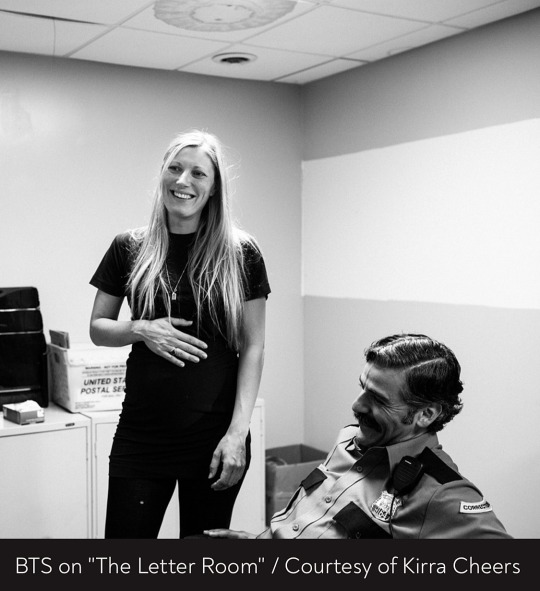
What was your experience with getting “The Letter Room” funded?
It’s really hard, let’s be honest. There aren’t a lot of people sitting around waiting to fund a short film. We ended up working with Topic, which is a part of First Look Media. They are just incredible and really support filmmakers with whatever their vision is. I’ve had great experiences and some really bad experiences with funding, so I know this was an ideal scenario.

Having a short that is over 30 minutes long seems like a feat. At what stage in the process did you know this was going to be a longer piece? And how did that decision affect the shoot in both positive and difficult ways?
It was way too long at first, and when I shortened it, it was still 32 minutes. We could only afford five days of shooting, and a lot of it is shot on active prison grounds, which have an insane amount of protocol. We almost used everything we shot.
I’m not used to being able to have different angles to choose from in my doc work, so I think I just knew exactly what I wanted. I know that my producers were worried that I wasn’t getting enough, but to me, I was like, I’m getting double of what I usually get on a documentary! Everyone was quietly concerned, but everything worked out when we got to the edit.
The short’s length hasn’t done any favors for me so far, but you need to breathe as an audience, you need to pace it out. If I cut out certain minutes, it would’ve felt rushed and you wouldn’t have believed the arcs that the characters had.

I loved the concept of placing a very empathetic character in a setting that is contrary to that personality type. You included so many details that made the world feel so three dimensional and cared for. Can you talk about those decisions to create that feeling?
It means so much to me that it made you feel that way. What frustrates me about the prison system is that it lacks any empathy or understanding of human nature and nurture and who we are. What we need to become better people. It takes all of that away.
I spoke to people who have spent a lot of time in prison and they told me that you have to hide your feelings and that showing any signs of weakness will be a disaster. It’s the worst possible scenario you can imagine yourself in. Being robbed of every privacy, anything that makes you happy, anything that makes you feel like yourself. I imagined the character of a caregiver in this setting who wants to help and finds a silly way to do so. I was very inspired by that story of the love letters that I talked about earlier. What does it mean to lie if you’re making someone else happy?
It’s the morning of your first day of the shoot — how do you feel?
I was very nervous. I had never said ‘action’ before. I’ve been on a lot of sets, but I didn’t want to seem like I didn’t know what I was doing, but it’s also okay not to know. Mistakes are going to happen, and sometimes they become gifts. At the same time, I was very excited. You come in and there are all these people there with you who are there to make this thing you’ve written come to life.
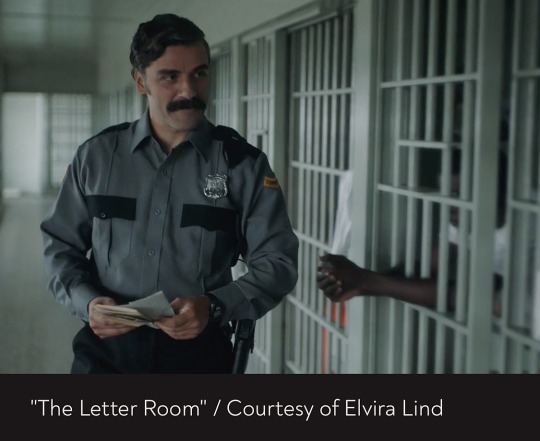
What are some things you would do on set to create a safe space and vulnerable environment?
We did everything we could to make the set a safe space. It was very difficult and stressful to shoot in an active prison, but we made sure to actively ask our crew if everyone’s feeling okay and if we can do anything to make the situation better. I’m very vulnerable and encourage all of my crew to be vulnerable with me. Mistakes are welcome.
It's a short film, people come and work on this not because they’re making a million dollars, but because they want to be there and are being incredibly generous with their time and energy. It was such a good environment that even when challenging things came up, it was still a lot of fun.

What was it like working with actors for the first time?
That was one of the biggest challenges for me. I’ve heard so many different stories in passing of the least helpful note or worst thing to say to an actor. You want to be respectful and actors have their way of working. Ultimately, they are all really talented actors and all of them came with so much energy and a lot of ideas.
I spent time with each of them talking about their character. Those 1 on 1 conversations helped me a lot in the writing process as well because you’re bouncing ideas off of each other and they’re asking you questions about how they would respond to a certain situation.
I had always imagined Alia Shawkat as Rosita and she ended up wanting to do it and came from LA to film it. I had tears in my eyes when we were filming the scene of her and Oscar. They were excited to do the scene together. It was all a dream.
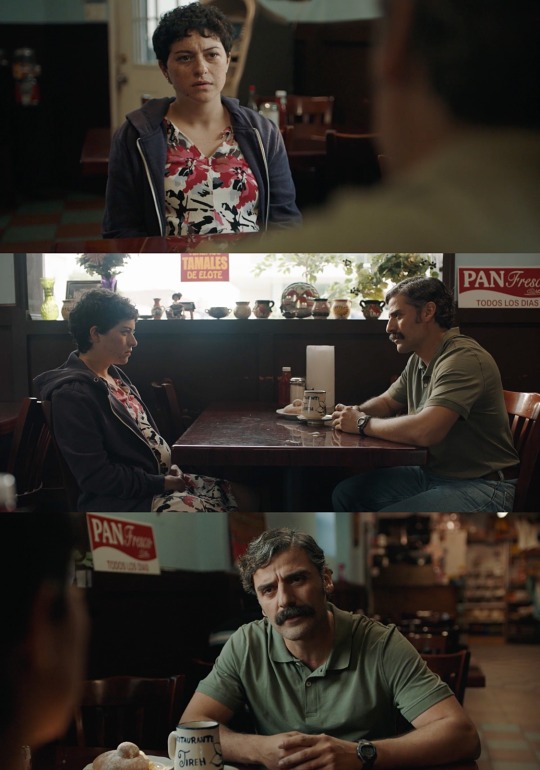
What was the experience of working creatively alongside your partner like?
We were joking a lot about it before because there was already the stress of being so pregnant and we have a 2 year old at home, and now I was putting us in another highly intense and demanding situation. Either it was going to be great OR we would drive each other nuts. But we had so much fun. It was wonderful to work together. I was so happy to be on set and make my film and he’s just so talented and fun to be around. Those little moments where you know each other so well—I’d give him notes and he just kept surprising me and was so respectful of my directions.
He found this photo for him to connect to the character and it became very fundamental to me. It was this incredible black and white photo from the 70s of a prison guard. I had always imagined that he would have this inner salsa soundtrack playing in his soul and we would play Rubén Blades and 70s salsa music and Oscar just morphed that into music into everything and created this unique character.
And he was wearing a fat suit the entire shoot and I was pregnant and Alia Shawkat had her pregnant belly on. The three of us—it was so funny.
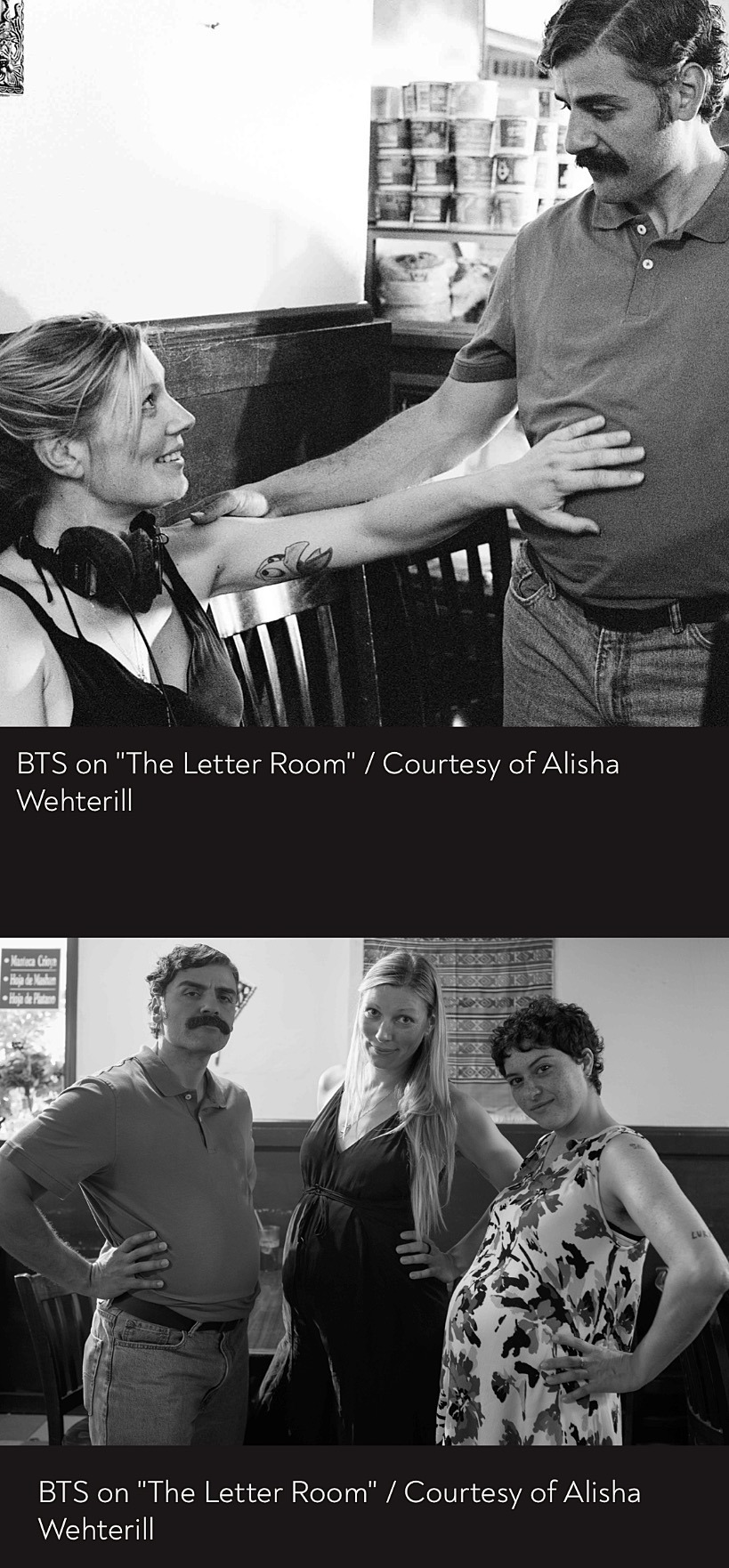
It seems like the perfect first experience of going into narrative with people that you really trust and support you.
Definitely! Find the people that you can team up with that really believe in your vision and who will push you to do exactly what you had in mind. People who never try to push you into these conventional routes. Our creative voices are so fragile. You want to be on the same page so that they see what you’re trying to do and want to bring that out of you. Where they’re treating your film as a sacred thing that you’re creating together.
How do you know when a film is done?
Fiction is very different from documentaries. With documentaries, it never feels like it’s done because there are so many options. That’s also why I love fiction so much; It’s so much faster. It’s a whole different beast to tame a documentary with hundreds of hours of footage where you’re reinventing the wheel every day.
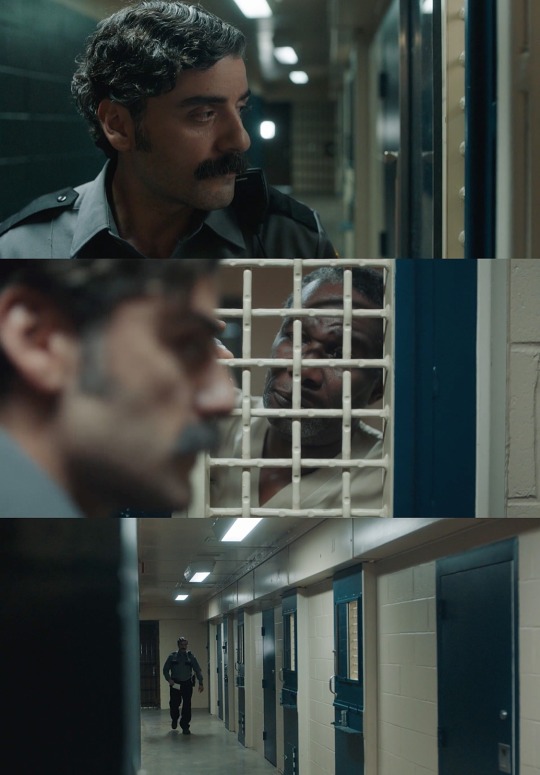
How have you built up your own confidence as a director and your unique voice?
Stubbornness. I’ve had many experiences working with people who didn’t believe in my project. You have to stick to your guns and trust your instincts. Once you find your voice, you find people that want to go on that ride with you and find your vision interesting. It’s a miracle when any of us gets a project made, so your confidence can’t come from how much money your movie made. It has to come from somewhere else. Did you do justice to the people you portrayed in your story? Did anyone walk away feeling like something had changed within them?
What is a good director to you?
Someone who is driven with passion without letting that passion take over and become any source of frustration that’s taken out on other people. It should feel like a collaborative effort. And having gratitude every day that you’re making something with other people who are donating their time. You’d be nowhere without them. One of the most important things is making sure that your crew is treating everyone equally. It depends on the size of the production, but having someone who can sense what’s happening in all different departments and having department heads that are there to protect everyone. Listen to each other, and make sure everyone feels safe and is in the best place to be creative.
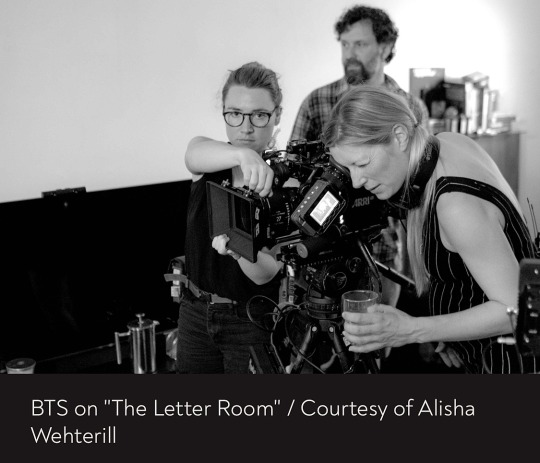
With COVID, what has the adjustment been like to being in an online space for this festival run?
I’m really deeply saddened by not having the human interaction aspect of it. It feels so crucial to be in the room together, to meet and see each other's projects and share the experience, to cry and laugh next to people you don’t know. I’m grieving to be honest. We just gotta get through this time. It reminds us of how sacred it is for us to gather and how that feels, and I hope that all of that will come back after this and that cinemas will survive. We really need them.
What’s next for you?
Right now I’m writing more fiction and working on a new documentary feature that I am kind of researching and shooting at the same time. I am also creating a podcast about sex, called “The List” with my friend, writer and photographer Kirra Cheers, based on a book and play she wrote. My husband and I just started a production company together, Mad Gene Media, in order to develop and produce our own material. So. lots of exciting things to continue with in the new year.

Born in 1981 in Copenhagen, Elvira Lind graduated from School of Media and Creative Arts in Cape Town in 2006 majoring in documentary film where she received two awards for her final year achievements. She has worked within that field since directing and shooting documentaries of various lengths for TV, cinema and web on 4 different continents.In 2020 she premiered her first fiction project, a 32 min short film she wrote and directed. The film was sold to Topic and was invited to various festivals including Telluride and Tribeca FF. Elvira's feature doc BOBBI JENE premiered at Tribeca Film Festival in 2017 where it won all awards in its category including Best Feature documentary, best editing and best Cinematography. The film had theatrical release in US, Spain and Scandinavia.Elvira's first documentary feature Songs for Alexis premiered at Toronto HOT DOCS in 2014 and screened and competed at a long list of international festivals. Her 8 part documentary TV series "Twiz and Tuck" was bought by VICELAND and launched in 2017. Elvira now lives and works out of New York.
###
91 notes
·
View notes
Text
Michael Sheen: The pandemic has shown what is possible on homelessness
The actor now uses his Hollywood cash to fund his passion for activism. Sheen reveals why he revels in spending money on the things that matter and why he has hope for the post-Covid future.
Michael Sheen, activist and actor. It is in that order these days. And he’s doing rather well in both spheres. He has spent the last few years trying to find a way to balance his twin passions. And, he says, he is slowly getting there.
“A big part of it was shifting things in my head and knowing what the priorities were,” says the 51-year-old.
“I made the shift psychologically to go, right, the acting work and everything that comes with that is going to support the other stuff I’m doing.
“So even though to the outside world, maybe it wouldn’t seem like it – because I’ve been doing lots of acting work and things that have kept the profile up and all that – from my point of view, the priority has been different. Now the acting work fits in around the other stuff.”
That ‘other stuff’ involves supporting the Homeless World Cup and the fight to expand access to affordable credit, campaigning to get the right to a good home enshrined in law in Wales and combating loneliness with the Great Winter Get Together (an idea inspired by the late MP Jo Cox). Then there’s working with Social Enterprise UK, for whom he is a patron alongside The Big Issue’s Lord Bird, helping local journalism and communities get access to trustworthy information, publicising and supporting both foodbanks and theatres and fighting period poverty.
It’s a heady and righteous cocktail of vital causes. And it takes up a lot of Sheen’s time. With the Covid pandemic of 2020, and Brexit around the corner, he feels his activism is going to be more important than ever in 2021.
“Everything that was happening before Covid came along which has been exacerbated,” says Sheen. “So it’s not like issues I was focused on beforehand – around homelessness and high-cost credit – are going away.
“We’re bracing ourselves for it getting a lot harder and more people being involved. The work that was going on pre–pandemic is going to get even more pressured. Because when you look into anything around poverty and inequality before the pandemic, the fallout from the way Universal Credit was being rolled out was having a massive effect. Well, there’s going to be a lot more people on Universal Credit now.”
But Sheen also sees this as a moment to seize, a chance to rebuild society anew, a period that is packed with potential.
“We saw what was possible around homelessness during the pandemic, where people were able to get off the streets and were put into accommodation and given support that wasn’t there before,” he says.
“That has made a lot of people think. If that’s possible during a pandemic when people are really motivated, then why can’t it happen afterwards as well? Why does it take a pandemic to do it? We have seen that the fact there are still people living on the street is a political choice.
“So while we are bracing ourselves for really challenging times, that’s balanced out by a sense that there’s the chance to build up from the ground again. How do we reimagine who we are and how we live and how we work together? The status quo wasn’t working. So we have to innovate, we have to reimagine, we have to reinvent – there is a moment of possibility to build back better.”
He is on a roll. He sounds like a politician. A good politician. With that rich, sonorous voice rising as he advocates a new way of living, a new vision for society. He compares the imminent, we hope, post-Covid moment to the situation facing the post-war Attlee government.
“When you go through a big, nation–changing event, which this has been, there’s the opportunity to reimagine a different relationship between the state and society and between us as a community,” he continues. “To see how communities have pulled together gives you a new awareness of who we are and what we can be. We can rebuild our nation in the light of that.
“There won’t always be that window of opportunity. We’ll go in a new direction and a new status quo will emerge. Let’s hope it can be a fairer one.”
But Sheen is not just about ideas for a brighter future for Wales, the UK, and beyond. He’s also at the top of the acting profession. And we’ve seen a lot of him in 2020.
There was his brilliant, uncanny, portrayal of Chris Tarrant in Quiz back in March – the memorable pop-cultural drama-doc which drew a massive lockdown audience to its exploration of the infamous, scandalous, did-they-didn’t-they ‘cheat’ storm on ITV’s Who Wants To Be A Millionaire – shedding light on the inventive, pre-internet ways WWTBAM fans across the country hooked up to game their way onto the show.
Sheen was – not for the first time in a career that has seen him portray with such skill a diverse crowd of famous names, including Brian Clough (The Damned United), Kenneth Williams (Fantabulosa), Tony Blair (The Deal, The Queen and The Special Relationship), and David Frost (in Frost/Nixon) – utterly, bewilderingly believable as Tarrant and the three-part series, aired over consecutive nights, was genuine event television.
Then, when it became clear this pandemic and these lockdowns weren’t going anywhere fast, Sheen joined forces with his Good Omens co-star David Tennant to make Staged – the first, and perhaps only show to capture the tedium, the disconnectedness, the discombobulation of lockdown life.
With the big–name actors playing heightened versions of themselves – Sheen pompous, cultured, guzzling wine, Tennant eager to please, upbeat, hapless – it was a roaring success on iPlayer.
“David is very different to what you see in the series in real life,” says Sheen. “But although I’d like to say I’m different to the version of me in Staged, that’s pretty much what I’m like.”
The surprise second series of Staged catches up with Sheen and Tennant (or should that be Tennant and Sheen?) a few months down the line.
“We knew the series was very easy to do, filming it at home on a laptop – or that even if we went back to a more normal life again and were working elsewhere, we could film it anywhere,” says Sheen.
“And by the time we came to the second series, it was different. Even though we were still spending a lot of time at home, the second series was during a period where everybody, including David and I, were trying to go back to do things. Then the rules kept changing.
“So you never quite knew whether what was going to happen from day to day. The second series reflects that. But obviously, going back to work and trying to go back to normal is very different from me and David than they are for a lot of people – so we were aware that had to be dealt with as well, because never wanted it to be about two poncey actors and their lives. We wanted to find a way to do it so that people could still identify with it.”
This year, Sheen, like most of us, has spent more time at home. He has, he says, enjoyed catching fewer planes, appreciated his friends and extended family more than ever, raced through five series of Line of Duty and been wowed by Normal People, starting his way down Schitt’s Creek but still found little time to read novels (“I’ve asked for a few from Father Christmas”).
Because if he does find time to read, it is usually research on housing, on fighting poverty, on rebuilding the broken or the out-of-control housing market, alongside the occasional script.
But if 2020 has been about anything for Sheen, is has been about spending time with his baby daughter Lyra.
“When we went into that first lockdown in March, she was only five months old,” he says.
“So our focus has been her this whole time. Really our experiences wouldn’t have been massively different. The main overwhelming part of our experience of the last year has been having a baby, as opposed to Covid. And I know I’m very fortunate to be able to say that. But anyone who’s had a baby knows that that just takes up all your bandwidth.
“They give you structure, don’t they? A reason to get up in the morning. A lot of people have said it is difficult getting motivated to do stuff – but that’s not an issue when you’ve got a little one, is it? So I have got very used to being in the house. I even got to do two seasons of a TV show from my kitchen, which is pretty nice…”
Staged returns to BBC One and iPlayer on January 4
Michael Sheen on the legacy of the Homeless World Cup in Wales
In the summer of 2019, Cardiff hosted the Homeless World Cup. As the football tournament, featuring players from around the world, all of whom were experiencing homelessness, kicked off, we knew Michael Sheen had played a huge role in bringing the event to Wales.
What didn’t emerge until later was that, when some promised funding failed to emerge, Sheen was faced with a choice between sinking more than £1m of his own money into making it happen or cancelling the event.
He paid. They played.
It was a triumph and will last long in the memory. So how does Sheen feel now about it?
“It is an extraordinary event that happens every year,” he says. “It was going to be in Finland this year, which I was really looking forward to – because Finland has been quite pioneering in the Housing First strategy and I was looking forward to being able to find out more about that. But I still feel the way I did before – and what motivated me to try and make it happen here in Wales is that it is life-changing for people and can be a transformative experience in all kinds of ways.
“For some people who take part in it, it has an immediate effect. And for others, it may be years later that the effects of it manifest in their life. But that was why I was so committed to being a part of making that happen.
“A lot of the motivation for us in Wales was about what it could act as a platform for afterwards. And that has been affected by the Covid crisis, because a lot of the legacy work we were doing was unable to move forward in the way we’d hoped because of all the restrictions. But what I learned and discovered during that period has made a massive difference to me and the work I’m doing around homelessness.
“The relationships we developed through that time with support service organisations, the people I met and the insights I got into what people are struggling with and what would help were invaluable. It’s been a huge thing for me. I’m still paying for it. So that still affects my life as well, obviously, and things that I’m doing.
“But my acting work is there to support the other stuff. I’m putting money into things constantly, even though I still owe money to do with the Homeless World Cup. So until the time comes when I’m not able to earn money in the same way, then I’ll keep on spending it on the things that matter to me.”
SOURCE
#michael sheen#homelessness#his commitment and passion and effort to help others is one of the things I admire most about him#he does care#the big issue#poverty#constantly researching and coming up with ideas to help stop homelessness#non acting stuff#activism#staged#good omens
59 notes
·
View notes
Text
Pandemic Essay
We have all experienced the crisis in our country and affected by this current Covid 19 Pandemic. they're many people who lost their lives, lost their jobs and lost their businesses and it was so tragic to experience that situations as a member of society I have to do something to help my community and as simple as follow the policies that implemented in my community.
( CTTO )

Staying at home is the key effective to avoid the virus because we all know we are safe in our own houses. Year April 2020, As the school year was coming to a close and summer was edging around the corner, I began reflecting on how people will spend their summer breaks and so on they use a gadget to update about what happens to outside the world and entertain themselves through watching videos or filming themselves on TikTok and other social media platforms. During this remarkable time, the effects of social distancing can impact our mental health. Before the pandemic, many of us were already engaging in a form of social distancing. Perhaps not the same way we are now practising, but the technology we have developed over recent years has social connection and skills in general. Covid-19 will have on us all has more to do with social distancing policies than with any obstacles we now face due to the added precautions, despite how devastating it may feel that.

But for the sake of all, we have to be safe all the time and move forward for the future we can fight this Current pandemic if we work together with understanding and respect
12 notes
·
View notes
Text

Characters - Sawamura Daichi x Fem!Reader
Summary - Lockdown had really affected your social life and daily routine, luckily a certain someone was willing to help you get your life back to somewhat normal. What will happen when you start catching feelings?
Genre - Fluff
Warnings - Slight mentions of anxiety
Word Count - 2.3k
A/N - Back again with another Daichi fic! Are you surprised, probably not i got a one man mind lmao. This one isn’t as long as the last but still as fluffy, hopefully you enjoy reading it :) p.s. this was almost called Toothpaste I blame Jas👀
Covid-19 had really flipped your year in a completely different direction to what you were expecting. You started the year hoping to finish your last year of high-school on a high, helping the volleyball team get to nationals and getting into university. However, the world clearly had a different plan for you, when the virus first started you didn’t think much of it. Why would you? It was only when the announcement came that the country was going into lockdown that your brain finally registered what was actually happening. Being the slightly more extroverted individual you thrived off seeing your friends, plus both your parents worked as nurses. You were going to be alone.
The first few weeks went by pretty fast, managing to keep up a routine by going out for runs and making yourself eat at certain times. Even keeping in touch with your friends from the boys volleyball team as well as Kiyoko, one of your closest friends. However, after this fairly stable period you had a really bad day. Nothing went your way, blender… broken, guess you weren't having a smoothie this morning. After that frustrating incident Tanaka and Noya decided to start poking fun at you in the group chat, which you were NOT in the mood for. Group chat… Muted. It was also raining extremely heavy so you decided maybe a well deserved rest day was in order, throwing on the TV you flopped down on the couch to start your film marathon.
5am. That was the time it was when you finally passed out on the couch. How did you end up staying up that late, Harry Potter. Why you thought it was a good idea to start watching the films you don’t know, but you managed to watch them all, all 19 hours of them. That was all it took to mess your routine up for the next month, not waking up till 2-3pm everyday just to lounge around. Barely keeping in touch with anyone, you hadn’t talked in the groupchat for close to 3 weeks, hardly even thinking about eating anything but snacks.
Luckily you had a saving grace, Daichi. After going MIA , the third year’s started to get worried about you, especially Kiyoko. She had dmed you multiple times and got nothing in return, mainly because you saw the messages but forgot to reply. You were a whole ass mess to put it plainly.
~ 3rd Years Group Chat ~
Kiyoko - I’m worried about [y/n]...
Suga - Tell me about it, she hasn’t been in the chat for weeks
Daichi - Have you tried dming her?
Kiyoko - She is ignoring me, she hasn’t replied to one of my messages
Asahi - Maybe she’s just busy?
Daichi - In the middle of lockdown…
Suga - Yeah thats unlikely
Kiyoko - Can one of you dm her as well? I just want to make sure she’s ok?
Daichi - I can... i’ll let you know if she replies and if she doesn’t Asahi or Suga can try
Having received a concerned message from Daichi, you realised how much you had lost track of everything and anything. Replying to both him and Kiyoko apologising and explaining you had just forgotten to press send. Although Daichi wanted to believe that was the case he couldn’t, instead of being upfront about it though he started messaging you throughout the day. Just small things asking if you had eaten and if you were staying hydrated, little did he know that this helped you get back into a better rhythm of lockdown life.
You slowly fixed your sleep schedule and got back to eating 3 meals a day. Although you hadn’t managed to get back into running, your talks with Daichi slowly got more frequent and for longer periods of time. The more you talked to him the more motivated you started to feel, eventually you got back into your running routine. It no longer became the odd message to make sure you were eating, but full day conversations about anything you could think of. Eventually you started relying on talking to him to cure your lockdown loneliness, a day without talking to him was not a good day for you. Daichi being the fairly observant person that he is, started to realise and eventually bought it up.
Daichi :) - Hey [y/n], I've been meaning to bring something up with you, you mind if we call?
[y/n] - Yeah sure Dai, just call me whenever i don’t exactly have anything going on
Receiving this was like a bullet to the chest, worrying what it could be about you pulled your knees up to your chest steadying your breathing. As you were lost in your head, your phone started ringing. Answering it you heard his voice for the first time in close to 3 months, it was music to your ears. Slowly over these 2 months you had grown fond of the boy, but you had quickly dismissed the idea of anything forming between each other. Both having different priorities in life, being scared of rejection also didn’t help.
After an hour and a half of deep conversation, a couple tears shed but more laughter at the end. You collapsed backwards onto your bed, he had found out everything. How your parents were barely home, always doing long shifts at the hospital, how you felt like you had no one during those 3 weeks you were MIA. Most importantly though you had confessed that talking to him was like receiving a warm hug. It's exactly what you needed at this time, obviously you would love an actual hug as well but that's pretty hard from a 2m distance.
~ 1 week later ~
Your eyes went wide as they announced on the news that lockdown was starting to be lifted, you were now allowed to meet up with people outside at a safe distance. Smiling you quickly messaged Daichi telling him how excited you were that restrictions were finally being lifted.
Daichi :) - That's Great [y/n]!! So.. you fancy going on a socially distanced pic-nic tomorrow? Don’t worry about bringing anything but yourself. I got the rest covered, obviously if you're ok with that?😃
Reading the text over multiple times, pinching yourself to make sure it was real. You hadn’t seen Daichi in close to 3 months, and within that time you had developed feelings. What would it be like seeing him in person now, generally being awkward with past crushes, you started to worry about scaring him away. You couldn’t do that, you needed him. Taking a couple paces around the room thinking about what to reply, before realising you were most definitely overthinking it. He didn’t see you that way…
[y/n] - Yeah sure! Just let me know a time and place, i will be there
Daichi - 1pm at the park round the corner from your house?
[y/n] - See you there!!
The next morning you woke up with a huge smile plastered on your face, excited for the day ahead. Jumping out of bed and rummaging through your wardrobe you pulled out a cute summer dress, not too dressy but showed you put effort in none the less. The summer dress was red and was covered in little white flowers, you had only worn it a couple times and decided it needed another outing.
Walking down your road and around the corner to the park, the wind hitting your face made you feel like maybe the world was getting back to normal. As you walked through the gates, you noticed Daichi stood over by a slightly more wooded area, smiling as you made your way over to him. Greeting each other you forgot how much his laugh and smile made it seem like nothing else mattered, making your heart beat faster in your chest. He ended up leading you through the woods and into a small opening which had 2 picnic blankets laid down at the appropriate distance. As you got closer you noticed that there were sandwiches, fruit and small cakes on both.
‘You didn’t have to do this Daichi you know? A simple sandwich would have been fine?’ You started smiling at him, no one had ever gone to this much effort for you and honestly you felt bad. ‘It must have taken you a bit to set this up…’
‘Oh no, honestly don’t worry about it… i wanted to, neither have been out in a while so i figured why not?’ The laugh that came out sounded almost nervous, which confused you slightly… Was he really as nervous as you?
The afternoon went by quicker than both of you wanted. Chatting, cracking jokes and eating, which the food Daichi had made was really good. You had asked why he had never told you about his clear culinary skills, apparently this was the first time he had attempted something like this. Trying not to get too far ahead of yourself when he had mentioned this, even though you were freaking out. Mainly chatting about quarantine life and how you missed being out of lockdown, being able to socialise freely and do whatever you wanted.
You only realised how long you had been with Daichi when it started to get dark, letting him know you should probably be getting back. Even though in reality you could have stayed there for the rest of the night and into the early morning. Helping him pack everything up occasionally sneaking glances at him, wishing you could pull him into a hug or give him a peck on the cheek. Just to let him know how much he had helped you over the past month. Sadly you couldn’t, once everything had been packed away Daichi (being the gentleman that he is) offered to walk you back.
‘I had a really good afternoon, thank you for this Daichi…’ Smiling at him as you walk up to your front door.
‘Would you want to do something like this again maybe?’ The way he looked at you, his eyes almost pleading, with a slight smile gracing his lips. This made your heart instantly melt.
‘If you want to? I would love that!’
‘[y/n]... why would i ask if i didn’t want to?’ Raising a brow at you playfully.
‘Shut up you dork, i’ll see you soon then!’ Laughing as you walk through your door giving him a wave before closing it and sliding down it on the other side, trying to calm your heart that was about to burst through your chest.
Another couple weeks past, you had only met up with Daichi once more, but both were still texting all day with the occasional call. You also had met up with Kiyoko within these weeks, explaining your situation. She thought it was really funny how much you were worrying about it because to her it seemed obvious that he returned your feelings. You were still completely denying this fact though, it was something your brain really couldn’t fathom. However, the next day lockdown was reduced once again, you were now allowed to have people in your house from other families.
Being as excitable as you were and the fact your parents were out almost all of the time, you rattled off a text to Daichi asking him if he fancied a chill movie marathon night? Both of you deciding to watch The Hobbit trilogy later on in the evening. Hopping up from the couch you started cleaning the house, preparing snacks and setting up pillows as well as blankets on the couch. Seen as though it was a chill night you had decided on a pair of grey sweats and a plain v-neck t-shirt, that was tied so it wasn’t too long.
You had just finished setting everything up when there was a knock at the door, practically running to get it. Opening the door to his smiling face made something snap and you don’t know what came over yourself as you jumped into his arms, wrapping your own around him. Luckily he was quick to catch you.
‘What did i do to deserve this hug?’ He chuckles to himself as you nuzzle into his neck.
‘Everything. Daichi I owe you so much, you don’t even understand’ Letting out a sigh, he closes the door and carries you over to the couch. Placing you down next to him as you pout at him, sad that the hug was over so soon. You had waited for so long to be wrapped up in his arms and when you finally get the chance it barely lasts 2 minutes.
‘Listen Daichi… you have helped me so much over the past few months, and honestly…’ Taking a breath to figure out how to phrase your next words, however before you could say anything else he had pulled you back into his chest.
‘I like you too dork…’ Frozen in his arms, how long had he known… How long had he liked you back? All you could do in that moment was snake your arms round him and enjoy each other's company as he started the first film.
~ BONUS ~
‘How long have you liked me Daichi?’ You question him half way through the first film.
‘About 6 months give or take why?’ He turns his attention towards you and gives you a quick head kiss, before looking back to the film.
‘6 months… that's before we went into lockdown..?’
He hums, smirking at your clearly oblivious nature, as your brain was spiralling thinking about how many signals you missed.
Tags: @super-noya @stcrryskies @iwaxme @bb-noya @vventure @ardorwrites-hq-mha @scorpiosanssexy
#Daichi#sawamura daichi#daichi owns my whole ass heart#haikyuu#daichi#daichi sawamura#haikyuu fanfic#hq fanfic#daichi x reader#sawamura daichi x you#i am in love with this man#fanfic#oneshot#hq writing#daichi writing#daichi x you#haikyuu x you#hq daichi#hq anime
116 notes
·
View notes
Text
Everything That Happened at the 2021 Golden Globes

The first two months of the year are finally over and as the days grow longer, we can start to see the early signs of spring. With spring comes summer and with summer comes an influx of movie releases, with the majority of films that were put on hold last year scheduled to be released in the following months in cinemas across the world. You know, cinemas, as in those big rooms where you pay to sit and watch movies from start to finish without pausing it? Gosh have I missed the pre movie adverts, comfy chairs and super wide screens. It's not the same at home and despite Netflix, HBO and Amazon Prime thriving, we shouldn’t set anything in stone when it comes to the quality and accessibility of film.
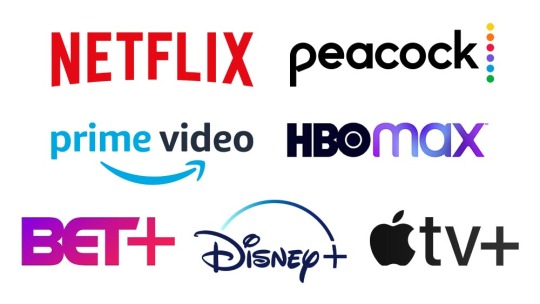
Cinema is tradition whereas On Demand is convenience and usually choosing convenience over tradition does impact the quality of work being distributed. There are a bunch of films on streaming platforms that would be too inappropriate for cinemas, seeing as they lack a cinematic or dramatic feel to them to be good enough for a big screen. This allows mediocre to downright awful films to find an audience via streaming platforms. All well and good, seeing as these platforms are great exposure for upcoming filmmakers but at the same time it's a capitalistic system that puts views above the quality of content. It doesn’t matter if what you’re watching on Netflix is bad, they just want you to keep coming back for more. This can be said for mainstream cinema too, but to a lesser degree seeing as cinemas typically release around 68 movies per month, whereas Netflix has the ability to add up to 200 releases on their platform per month. It makes perfect sense that Netflix has the viewers that it does, as we can see that it releases almost twice the content of cinemas per month. For the avid cinephiles, this leaves us wanting a lot more as we’re only able to enjoy maybe one or two films a month from online streaming services, because the quality is so inconsistent. I hope that cinemas open soon so that I can relax knowing that the film I’ve paid money for will be of a good quality.
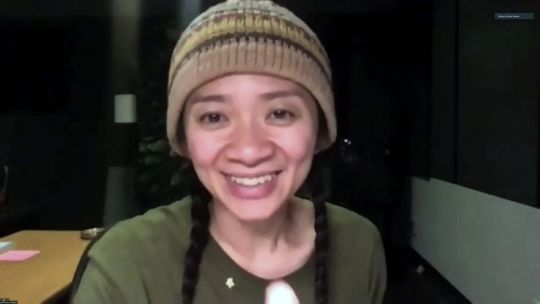
Speaking of good quality films, Chloé Zhao, director of Nomadland (2021) became the second woman in the 78 year history of the Golden Globes to win an award for directing. This is an exceptional triumph and from the moment I saw Nomadland, I knew that it would have an incredible impact on awards circuits this year. Nomadland also won Best Picture, which proves something that up and coming filmmakers may need to start getting their heads around. People may not necessarily be gravitating towards cinema for a chance of escapism any more. I thoroughly believe those days are behind us, buried in the 70s and 80s with films that defied the laws of filmmaking and went to extreme lengths to serve us an entire universe that we couldn’t even comprehend. However, as the world grows more fragile and people start to realise the fragility of life, we want to connect with one another authentically and realistically.
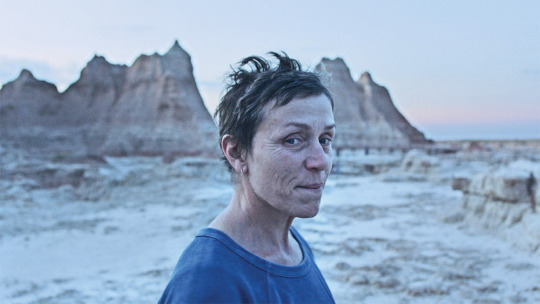
The way that film can do this is by showing our real selves on screen, showing our pain, redemption, emotions, fear, honesty, laughter, race, gender, humanity, darkest secrets and biggest dreams using the backdrop of cinema to sell us a story. People want films that are honest and are a reflection of humanity as well as the current society we’re living in. Not necessarily “a slice of life”, but a slice of humanity that we never see because it’s never impacted us directly, yet we still want to be made to feel like it has through film. That’s the key to success in any film, making the viewer feel like they’ve experienced something on screen even when they haven’t. If the film is too far away from our own psyche or humanity, we switch off, as we can no longer relate or even want to relate to something so obtuse and boring. Nomadland was the complete opposite to this theory, bringing us humanity in all its glory; its sadness and pure emotion that affects millions everyday, especially in such a time when loneliness is rife.
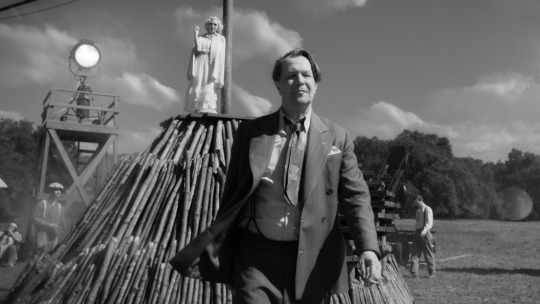
This is why Mank (2020) lost out. In a time where the world is in a sensitive disposition, Mank came as ineffective to the world of film. Though triumphant in it’s making, the film proves the fundamental foundation of film that Mank failed to do; have a good story. Mank just wasn’t the story people wanted or needed to see and one can appreciate a filmmaker’s efforts to make films but at the end of the day, the story is truly the only thing that’ll carry a film and if it's uninteresting and impersonal, people switch off. And they clearly did, seeing as Mank lost out to all SIX of its nominations. Less is more, I suppose, seeing as Nomadland won two out of four awards, including the top prize of Best Picture. David Fincher even took a shot every time he lost a category. Better luck next time.Other snubs included Emerald Fennell’s Promising Young Woman (2021) starring Carey Mulligan ,which was released on VOD last month. The film was nominated for four prizes and I suppose the lack of release in cinemas worldwide or at a Film Festival meant the lack of hype for the film. Regina King’s One Night In Miami...failed to pick up a prize, having been nominated for three awards. King shouldn’t be too disheartened, seeing as her debut definitely got her the recognition she deserved.
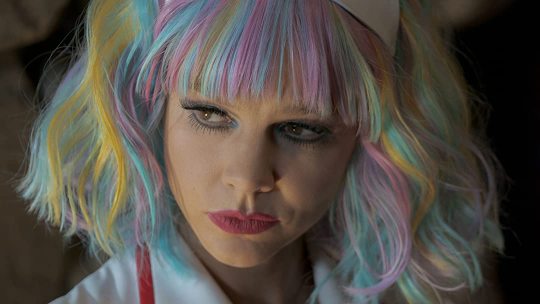
Aaron Sorkin most notably won Best Screenplay for his amazing picture, The Trial of the Chicago 7. I had the fortune of catching this in cinemas and the musicality of this screenplay was unreal. An incredibly authentic, riveting and honest piece of work, I believe we can safely say that Aaron Sorkin is the greatest writer for cinema and TV in our day and age. Sorkin is used to being showered with accolades, from Primetime Emmys with The West Wing, to an Oscar with David Fincher’s The Social Network.
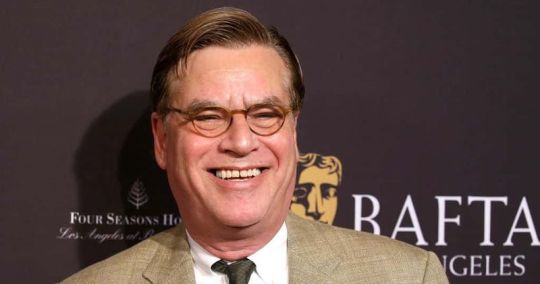
The late Chadwick Boseman was honoured in full glory, having won the award for Best Supporting Actor in a Motion Picture for his role as Levee in Ma Rainey’s Black Bottom. An exceptional performance that reeks with Oscar success, Boseman is the first actor to be awarded the prize posthumously.
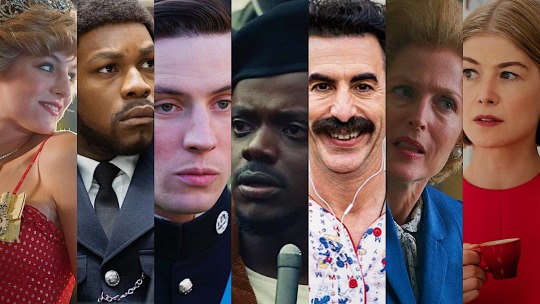
What’s also to be noted is the amount of British nominees and winners at this year’s ceremony. It seems like the American Film & TV market is wide open for Brits, seeing as Emma Corrin, Josh O'Connor, Daniel Kaluuya, Sacha Baron Cohen, Rosamund Pike, John Boyega and Anya Taylor Joy all won awards for acting. Helen Bonham Carter, Olivia Coleman, Vanessa Kirby, Riz Ahmed, Gary Oldman, Antony Hopkins, Dev Patel, James Corden, Hugh Grant, Jodie Comer, Lilly Collins and Nicolas Hoult all received nominations and were all born in the UK. The Crown in particular just seems to be getting more successful with each year and despite its controversy, the show has won Netflix 7 Golden Globes and 10 Emmys. What does this tell us about our actors and their ability in comparison to our friends overseas? Is it just a stroke of luck that the majority of actors who won this year are British or are we doing something different? Only time will tell as more British actors begin to be recognised for their flare over in the US.
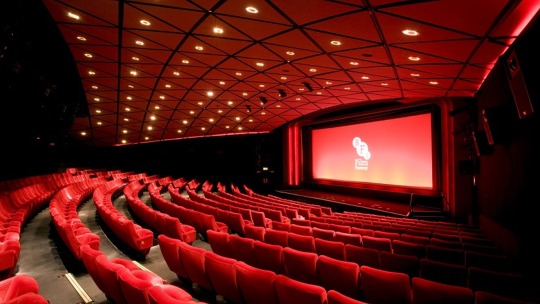
If anything, we’ve learnt that The Golden Globes is for everyone. Anyone can win an award despite their background as long as those who control the awards ceremony are willing to give a variety of films a chance, not just ones directed by David Fincher. Nomadland is certainly an underdog for cinema, one that may not have done as well had other films been released last year. COVID-19 created space for this film to be seen and has truly been taken in as a work of art, proving that films of the same kind deserve to be seen in the up and coming future. British actors can and have made it big in Hollywood and it seems like American audiences welcome them with open arms. Sacha Baron’s Cohen’s humour in Borat Subsequent MovieFilm wasn’t unrequited, seeing as it won Best Musical / Comedy at this year’s award season, meaning every moment of that film (incriminating or not) WAS WORTH IT. Even though Regina King and Emerald Fennell lost out on their respective films, their work has been courageous and profound in helping to give space to women in the film industry. The fact that they were even nominated along with Chloé Zhao, was an achievement in itself and has women like me looking up to the success of these three women and realising that I could have the same shot. Mank came at the wrong time, and though good visually, it lacked a beating heart that the Golden Globes could identify with enough to give it at least one award. Soul was named Best Animation Feature Film of the year, also winning an award for music with a beautiful score by Atticus Ross, Trent Reznor and Jon Batiste. The Queen’s Gambit also reigned supreme, as Anya Taylor Joy won Best Actress for a performance in a mini series / tv film and the overall series won Best Television Mini Series / Television Film.
This has to be the best Golden Globes I’ve ever witnessed. Not only did it champion diversity in the film categories, British Actors and female directors, it actually gave consumers as well as judges, something that actually wanted, which was to see underdogs thrive in an environment that’s usually laid bare for the same characters. Let’s keep this up for the next ceremony !
ig @ratingtheframe
#the golden globes#movies 2021#nomadland#frances mcdormand#chloezhao#female directors#mank netflix#david fincher#daniel kaluuya#the crown#Netflix Orignal Series#emma corrin#borat subsequent moviefilm#sacha baron cohen#regina king#Carey Mulligan#promising young woman#Rosamund Pike#i care a lot#british actors#Aaron Sorkin#the trial of the chicago 7#the oscars#soulmovie#anya taylor joy#the queen's gambit#chadwickforever#chadwick boseman#ma raineys black bottom netflix
10 notes
·
View notes
Photo
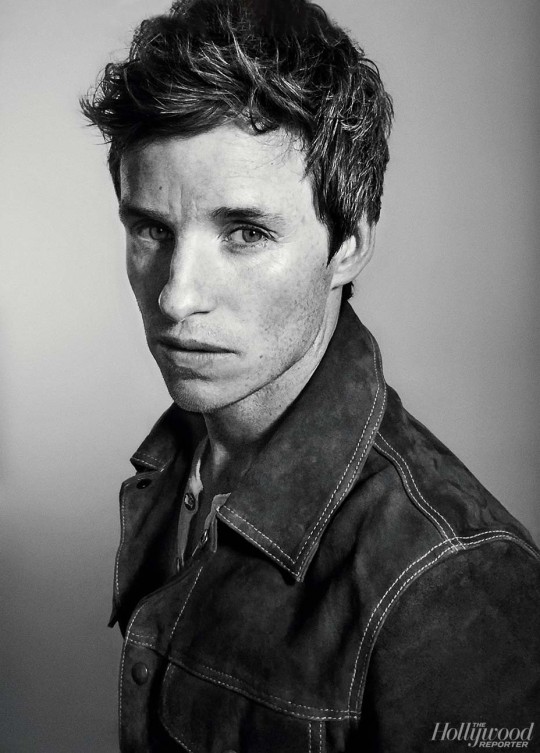
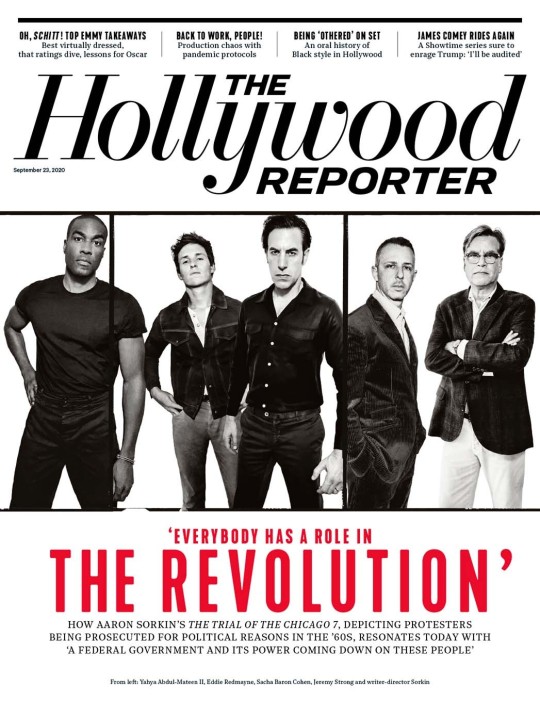
photos by Frank Ockenfels
The Long Journey and Intense Urgency of Aaron Sorkin's 'The Trial of the Chicago 7'
by Rebecca Keegan September 23, 2020, 6:00 am PDT
The director of the Netflix film, which stars Sacha Baron Cohen, Jeremy Strong, Eddie Redmayne and Yahya Abdul-Mateen II, reveals why it took nearly 20 years to get the project about the politically motivated prosecution of protestors made and why it couldn't be more timely: "I never imagined today would go so much like 1968."
In October 2019, hundreds of protesters marched down Chicago’s Michigan Avenue toward the Hilton, chanting phrases like "No justice, no peace!" and "A people united will never be defeated!" as police in riot gear descended on the crowd with billy clubs and tear gas. Earnest and energized, clad in 1960s period costumes and flanked by vintage police vehicles, this group thought they were acting out the past, staging a scene from Aaron Sorkin’s The Trial of the Chicago 7. As it turned out, they were performing the future, too.
Sorkin’s film, which opens in select theaters Sept. 25 and hits Netflix on Oct. 16, tells the story of the riots at the 1968 Chicago Democratic National Convention and the circus-like trial of political activists that followed the next year. Thanks to Hollywood development hell, the movie is arriving 14 years after Steven Spielberg first mentioned the idea to Sorkin but just as its themes and plot points — civil unrest, a self-proclaimed "law and order" president’s vilification of protesters (Nixon then, Trump now), the police’s excessive use of force, tensions within the Democratic Party over how far left to move — have become bracingly current."I never wanted the film to be about 1968," Sorkin says in an interview over Zoom from his house in the Hollywood Hills on Labor Day weekend. "I never wanted it to be an exercise in nostalgia or a history lesson. I wanted it to be about today. But I never imagined that today would get so much like 1968."For only the second time in a career spanning nine films as a screenwriter, Sorkin serves as director with Chicago 7, helming a sprawling ensemble cast that includes Eddie Redmayne as anti-war activist Tom Hayden, Sacha Baron Cohen as Youth International Party (Yippie) provocateur Abbie Hoffman, Succession’s Jeremy Strong as counterculture figure Jerry Rubin and Watchmen’s Yahya Abdul-Mateen II as Black Panther party co-founder Bobby Seale. There are undeniable parallels not only between the film and the present political moment but also between the performance-art activism of the actors and the men they’re playing, most vividly Cohen, who, like Hoffman, has made a career of political self-expression through comedic stunts, including crashing a far-right rally in Olympia, Washington, this summer while pretending to be a racist country singer. (Cohen, who shoots most of his satirical projects incognito, impishly calls reports of his appearance at the rally "fake news.")Eight months after Sorkin filmed the protest scenes in Chicago, Abdul-Mateen was marching in Black Lives Matter protests in West Hollywood, as was Strong in Brooklyn. "There’s power when a lot of people come together to protest out of anger, out of frustration," Abdul-Mateen says. "Everybody has a role in the revolution; this film shows that.
"Though the movie feels crafted for this political moment, it was born of another. At Sorkin’s first meeting with Spielberg, "I remember him saying, 'It would be great if we could have this out before the election,'" Sorkin says. The election Spielberg was talking about was 2008’s, when Barack Obama and Joe Biden faced John McCain and Sarah Palin.The film hit multiple roadblocks, beginning with the 2007-08 writers strike and continuing as financing faltered repeatedly, a fate illustrated by the more than 30 producers who can claim some sort of credit on Chicago 7. It took another unscheduled detour this summer after Sorkin finished it as the pandemic worsened, and the odds of original distributor Paramount mounting a successful theatrical release before the Nov. 3 election seemed increasingly slim. For some involved with the film, there is a question about the ethics of Hollywood inviting audiences to return to theaters before a COVID-19 vaccine is widely available. "
There’s a moral quandary that we, the motion picture business, have to be careful that we don’t become the tobacco industry, where we’re encouraging people to do something we know is potentially lethal," says Cohen.Before his visit to Spielberg’s Pacific Palisades home to discuss the project on a Saturday afternoon in 2006, Sorkin knew next to nothing about the Chicago 7. The federal government had charged seven defendants — Hoffman, Rubin, Hayden, David Dellinger, Rennie Davis, John Froines and Lee Weiner — with conspiracy for their participation in the protests against the Vietnam War outside the Democratic National Convention. (Originally the men were known as the Chicago 8 and included Seale, who asked to have his trial separated from that of the others and postponed so that he could be represented by his preferred lawyer, who was ill; that trial never took place.)
When Spielberg proposed a movie about the riots and the trial that followed, Sorkin, who was 7 in 1968, said, "'You know, that sounds great. Count me in.' As soon as I left his house, I called my father and said, 'Dad, do you know anything about a riot that happened in 1968 or a crazy conspiracy trial that followed?' I was just saying yes to Steven."Despite his ignorance, Sorkin was a logical choice to write the project: Having penned Broadway’s A Few Good Men and its 1992 film adaptation as well as the long-running NBC series West Wing, he’d shown a flair for dramatizing courtroom procedures and liberal politics, and he turned in his first draft of the Chicago 7 script in 2007. Originally, Spielberg planned to direct the project himself, but by the time the writers strike was over, he had moved on and a number of other potential directors circled, including Paul Greengrass, Ben Stiller, Peter Berg and Gary Ross, though none was able to get it off the ground. "There was just a feeling that, 'Look, this isn’t an Avengers film,'" Sorkin says of the studios' move away from midbudget dramas and toward action tentpoles in the 2010s. "This isn’t an easy sell at the box office. And there are big scenes, riots, crowd scenes. How can this movie be done for the budget that makes sense for what the expectation is at the box office?"As the project languished, Sorkin tried writing it as a play, ultimately spending 18 months on a fruitless effort to fashion a stage treatment. "What I didn’t like was having a script in my drawer," he says. "I was just thinking, 'Jeez, this is a good movie and it feels like it’s stillborn.'"It was the confluence of two events that ultimately revived the film with Sorkin in the director’s chair in 2018 — the 2016 election of Donald Trump and the 2017 release of Sorkin’s well-received directorial debut, Molly’s Game, which doubled its production budget at the box office. "This is before George Floyd and Breonna Taylor and police protests or confrontations," Sorkin says. "This is just when Donald Trump was musing nostalgically about the old days when they used to carry that guy [a protester] out of here on a stretcher and punch the crap out of him."With Trump’s throwback rhetoric lending the subject matter a new timeliness and Sorkin’s directing chops confirmed in Spielberg’s eyes, the movie moved forward with its screenwriter at the helm.
Cross Creek Pictures came in to finance, and Paramount bought the domestic rights. But all those years in development had left an expensive imprint on the project — a jaw-dropping $11 million had been spent on casting costs, producing fees and the optioning of Brett Morgen’s 2007 documentary about the event, Chicago 10, leaving just $24 million for the actual 36-day production.
One way Sorkin attempts to achieve a sense of scope despite that budget is by intercutting real black-and-white news footage with his dramatized protests. He rounded out his large cast with a deep bench of experienced and award-winning actors including Oscar winner Mark Rylance as defense attorney William Kunstler, Oscar nominee Frank Langella as Judge Julius Hoffman, Joseph Gordon-Levitt as prosecutor Richard Schultzand, Oscar nominee Michael Keaton as former U.S. Attorney General Ramsey Clark — with the filmmaker and many of his actors working for scale. (Abdul-Mateen and Strong both became first-time Emmy winners Sept. 20.)Sorkin shot the protest scenes on location in Chicago and built a courtroom set in an old church sanctuary in Paterson, New Jersey, because none of the available courtroom locations in the Garden State conveyed the scope he wanted. "If we’re saying the whole world is watching, I want a packed courtroom for six months full of press and spectators," Sorkin says. "I wanted the big, cavernous feeling of the federal government and its power coming down on these people."
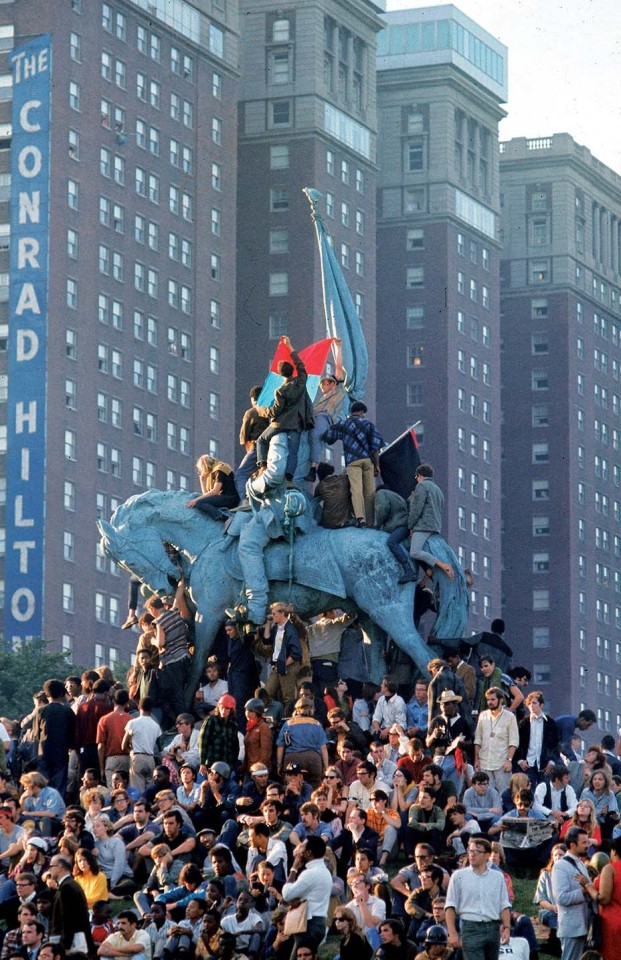
Julian Wasser/The LIFE Images Collection via Getty Images/Getty Images "The movie is tribute to the bravery of the protesters of 1968 [pictured] and today in Belarus, on the streets of America, in Portland," says Cohen.
Among the vestiges of Spielberg’s original plan was the casting of Cohen as Hoffman, which required the London native to affect a Boston accent and return to a subject he had studied as an undergraduate at Christ’s College in Cambridge, where he wrote a thesis paper about Jewish activists during the civil rights movement. At 19, Cohen had interviewed Bob Moses, the leader of the Student Nonviolent Coordinating Committee, which Hoffman was involved in before he founded the anti-war Yippie movement. "Honestly, I was very proud of the fact that Jews were involved in the Black civil rights movement in the '60s, and there wasn’t much written about it," Cohen says, explaining his youthful scholarship.
There’s a clear line to draw between Hoffman’s 1960s theatrics — which included throwing fistfuls of money into the gallery of the New York Stock Exchange and vowing to levitate the Pentagon — and Cohen’s contemporary TV and film pranks. Perhaps among Cohen’s most memorable and pointed gags was getting Vice President Dick Cheney to gleefully autograph a waterboard kit, which the comic did while posing as an admiring Israeli anti-terror expert for a 2018 episode of Who Is America?, his Showtime series. “What I wanted to do was to show that he was proud of torturing," Cohen says. "I could not believe how happy Cheney was to be sitting next to an uber-fan. So, yes. Ultimately in the shows and the movies that I do, I’m trying to be funny, but yeah, I’m trying to get out the anger that I have within me."
Cohen sees Hoffman’s unorthodox protest methods as pragmatic. "The Yippies were underfunded, and he was using theatricality to gain attention for his aims," Cohen says. "He wanted to stop the war. And how do you do that? You use stunts and absurdist humor to try to effect change." The actor estimates that, after researching Hoffman, he pitched Sorkin hundreds of lines the activist had really delivered. "As an annoying person with a lot of chutzpah, I was emailing Aaron every other night until morning, 'What about this line? What about this line?'" Cohen says. The writer-director, known for his exacting prose, politely tolerated the suggestions while largely sticking to his own script.
As Rubin, Strong is playing Hoffman’s conscientious jester sidekick, a role wildly different from the tragic, wealthy approval seeker he portrays on Succession. Strong added some of his own dramatic flourishes, including painting words on his chest for one courtroom scene and bringing a remote-controlled fart machine to disrupt Langella’s imperious judge. "I wanted to channel as much as possible that spirit of the merry prankster and of joyous dissent," Strong says. Hoffman and Rubin’s real-life personae were so large that Sorkin at times asked his actors to dial down their faithful portrayals, requesting, after one particularly jubilant take, "less cowbell."
Sorkin’s script draws a sharp contrast between Hoffman and Rubin’s campy methods and Hayden’s more reserved approach to the anti-war movement, with the tensions between Hoffman and Hayden supplying the film’s key relationship in a kind of begrudging brotherhood of the peace movement. To learn more about Hayden, Redmayne studied remarks that Jane Fonda, who was married to the activist and politician from 1973 to 1990, made upon his death in 2016. In his own life, Redmayne is cautious when it comes to discussing the role that he, as an actor at the center of a huge studio franchise (Warner Bros.’ Fantastic Beasts) might have in political life. "I find it endlessly challenging," Redmayne says of navigating his public activism. "There’s the elitist thing. It’s speaking up on climate change but being conscious that you’re traveling a lot. One has to be aware of one’s own hypocrisies, because they can be detrimental to something you believe in. So sometimes I find that I have to live my life and speak to my advocacy in a way in that it’s around friends, family and people I know rather than making something public."
Abdul-Mateen has begun his acting career largely associated with fantastical roles, like Dr. Manhattan on HBO’s Watchmen, Black Manta in Aquaman and Candyman in the upcoming Jordan Peele-produced remake of the slasher film. Playing Seale represented a chance to do more grounded work and to depict a man who had loomed large during Abdul-Mateen’s childhood in Oakland, where Seale co-founded the Black Panthers in 1966 and later ran for mayor. Seale’s inclusion in the original Chicago riots indictment was controversial and strange — prosecutors accused him of conspiring with men he’d never met after visiting Chicago that week for only a few hours to deliver a speech. For the prosecution, Seale functioned largely as a prop to tap into the fears of white jurors and white Americans watching the news coverage, and during the trial he had no attorney. "I wanted to key in on, how did Bobby Seale survive this trial?" Abdul-Mateen says. "How did he survive the gross mistreatment by the United States government, and how did he go through that with his head high and not be broken? It was an exercise in finding my pride, finding my dignity."
In one scene, Seale is brought into the courtroom bound and gagged, and throughout the trial he is kept separate from the white defendants. "Although it was meant to be a humiliating act, I walked out with my chest high, with my head high. Bound and gagged and everything else. It would be very dangerous for a Black man in that time, even sometimes today, to show the proof of the wear and tear that oppression can take on a person, because that can be seen as a sign of weakness, and a sign of weakness is an open door that it’s working." For the moments of lightness that Cohen and Strong bring to the movie, Abdul-Mateen supplies ballast. "It’s important for the right reasons and at the right time to make art that makes people uncomfortable," he says.
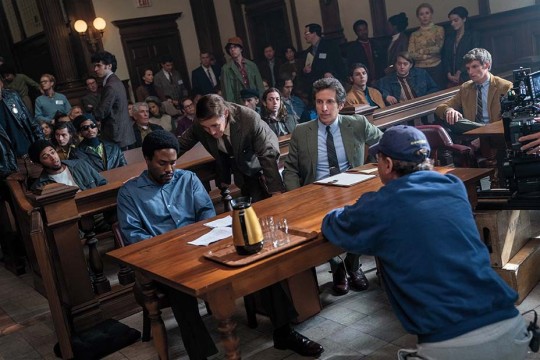
Niko Tavernise/NETFLIX. On the set, from left, Yahya Abdul-Mateen II, Mark Rylance, Ben Shenkman, Aaron Sorkin and Eddie Redmayne
Spielberg has remained involved in the film "in an emeritus role," Sorkin says, "from giving me good script notes to casting to notes on early cuts of the film." He also showed up to the New Jersey courtroom set. "When you have to direct a scene in front of Steven Spielberg, you’re not at your most relaxed necessarily," Sorkin says. Spielberg did not, however, take an executive producing credit on the film and declined to be interviewed about it.
The decision to switch to a streaming release came after an early summer marketing strategy call between Sorkin, Paramount chief Jim Gianopulos, other Paramount execs and some of the film’s producers. "At the end of the call, Jim said, 'Listen, we don’t know what the theater business is going to look like in the fall. We have troubling data telling us that the first people back in movie theaters are going to be the people who think that the coronavirus is a hoax,'" Sorkin says. This was clearly not the intended audience for a movie whose heroes are liberal activists. "I said, 'I don’t think the Idaho militia are going to be the first people coming to this movie,'" Sorkin says.
The group agreed to explore alternatives and gave Netflix, Amazon, Apple and Hulu 24 hours to watch the film. After a bidding war, Chicago 7 landed at Netflix in a $56 million deal against its $35 million production budget, with a robust marketing campaign and promise of a theatrical release. "We knew we didn’t have the option of 'Let’s wait a year,'" Sorkin says. "This is what we’re thinking about and what we’re talking about right now, and it just would have been a real shame to not release it now."
After Chicago 7 opens in limited release, Netflix will add more theaters in the U.S. and abroad throughout October, expanding upon the film’s premiere on the service, a strategy akin to what it provided Oscar best picture nominees The Irishman and Roma, albeit in a wildly different theatrical environment.
As Hollywood opens up to more production, Sorkin, and many of the Chicago 7 actors, have begun returning to work. Abdul-Mateen has been in Berlin for The Matrix 4 and Redmayne in London for Fantastic Beasts 3, while Sorkin is shooting a West Wing reunion special at the Orpheum Theatre in downtown L.A. that will premiere on HBO Max in October as a fundraiser for When We All Vote and include video appearances by Michelle Obama, Bill Clinton and Lin-Manuel Miranda
For the real-life Chicago 7, the denouement consisted of ultimately being acquitted of conspiracy. Judge Hoffman sentenced Seale to four years in prison for contempt of court, one of the longest sentences ever handed down for that offense in the U.S., but those charges were overturned on appeal. Just three of the original eight defendants — Seale, Froines and Weiner — are still alive, but the legacy of the case lives on in contemporary protest movements. "The movie is tribute to the bravery of the protesters of 1968 and the protesters of today in Belarus, on the streets of America, in Portland," Cohen says. "These people now are risking their lives, and they’ll continue risking them."
https://www.hollywoodreporter.com/features/the-trial-of-the-chicago-7-aaron-sorkin-and-stars-on-films-timeliness-to-election-and-why-everybody-has-a-role-in-the-revolution
#eddie redmayne#Aaron Sorkin#director#screenwriter#netflix#movie#the trial of the chicago 7#yahya abdul mateen ii#Sacha Baron Cohen#mark rylance#joseph gordon levitt#jeremy strong#Michael Keaton#The Hollywood Reporter#tom hayden#civil rights#frank ockenfels#photos#oscar winner#best actor#best cast#frank langella#newton scamander#newt scamander#fantastic beasts#the danish girl#the theory of everything
41 notes
·
View notes
Text
It Gets Better
This post is for anyone, but high schoolers and college peers especially.
Now, I know this past year has been extremely difficult. My plans also got thrown to the wayside which was completely heartbreaking. The only goal right now is survival-- keeping our head’s afloat until the new administration is in office and, hopefully, offers more aid regarding vaccinations, student loans, and stimulus. I can’t imagine going through what I did in high school right now, and I’m sure many kids are. I see you and I’m sorry. The best advice I can offer is to find a support system who cares and loves you, and possibly a therapist (therapy is great). Most people right now don’t know what high school and college students are going through.
Without going into too much detail, my social experience growing up was terrible. So much so that I finished high school online and went to college 1200 miles away at 16. And, as grateful as I am for those experiences, I was miserable the whole time. My plate was always overloaded, I constantly felt like I had to prove myself, and my whole identity and purpose was based on other people’s perception of me. Couple that with mental illness and it wasn’t a great time for anyone involved. I decided not to stay at my previous school and instead move back home and take a gap year to find a school that fit my needs better. This is one of the best decisions I’ve made for myself.
Especially in America, we rag on gap years because college is always seen as the goal in our education system. But taking a year off allowed me to work on my mental health, hang out with my real friends, develop skills I needed to reenter college, and just take a load off. I worked pretty much full time during my time away from school, and this also helped me solidify what I wanted to do (and also that I needed to get out of my hometown).
My gap year turned into a gap year and a half because of COVID. And I am in a very privileged position regarding the pandemic. As hard as it was to have my plans derailed, it gave me the option to look at why I chose the school I did, more financial options, and just reconsider everything so I was making the right choice in the short and long term. I ended up withdrawing from one school and committing to another, which is where I am now. But what is the most important thing I learned during my year off?
I have to do things for myself, not because I think it’s how others expect me to act based on what I think they think about me.
In other words, I learned I cared way too much about what others thought, and it was a big reason I was so miserable all the time and making decisions that negatively affected my health. As much as I said I was over the people who caused my trauma, it affected my ability to regulate what was important to me.
I chose the school I’m at now for a multitude of reasons. It has a great program, it’s close to the city, I’m here for ridiculously cheap out-of-pocket. But mainly I’m here because I want to be. Because I trust I can learn and grow here in a way I couldn’t anywhere else. Because I was able to let go of my baggage, pluck up some courage, and do the damn thing no matter what anyone else thought. And I’ve only been here about a week, but I have so much confidence and so many good feelings about my time here at my new school. I’m buzzing with excitement not only because I’m back in school, but because I feel ready to take advantage of opportunities that serve me and let go of the ones that don’t, even if they’ll pad my resume. I firmly believe that everything happens in due time, and I wouldn’t be here if I didn’t do the things I did when I was younger. I finally feel like I’m where I belong, surrounded by people who I can learn from and who want the best for me. And I never thought it would be where I am, but it is. But my younger self lived and yearned specifically for the freedom and peace that college would bring me, and I finally found it.
To make a long story short: it gets better. I know how hard it is, trust me. I know it feels like it won’t. I know you feel like you’re going to be surrounded by this gray film forever, your goals constantly just out of reach. And I know it’s hard to imagine who you’re going to be by the time you move into your freshman dorm or when you move out for that summer. But the only thing you can do is keep moving forward on your path. Even if people discourage you, even if your goals seem lofty, even if half the time you can’t believe you’ll make it. Stay in line. Allow yourself to be hurt by but also to grow from whatever bad things happen. Try to heal. Find people who support and love you, and realize they’re the only ones who matter when it comes to why you make certain decisions (but they never matter more than your instinct and heart.) You don’t have to prove yourself. You don’t have to post everything online for the world to see how good you’re doing. (And, I promise, no one is ever judging you as much as you think they are. People don’t care all that much unless you’re someone important to them.) Take a deep breath. Trust you’ll end up where you need to be, even if you’re not sure where that is right now. You got this.
#college#high school#advice#peer pressure#mentoring#i promise#it gets better#you matter#your goals matter#growth#moving on#growing up#moving to college#finding your place#mental illness#mental health#online school
16 notes
·
View notes
Note
genuine question: why is staged cringe?
I want to preface this by saying that I loved Staged initially. I thought it was a super cool concept with actors I’m fans of. I still think that it is a really cool concept! I think it’s great that these actors hatched this idea of acting from home over video chat. I love it when people are experimental. I love it when people break the status quo with art.
However, I think that this is one of the downfalls with Staged. There’s so much potential there, and you really notice how much of that was squandered when you start noticing the things about the show that don’t sit right with you. At least, that’s how I felt.
It really is a matter of, “I feel like this show aged poorly. For the love of God, make series two different.”
I have a lot to say about this, so I’ll put it under the cut and in sections haha
Superwomen
This was my biggest peeve with Staged. I felt like the women (mostly Anna and Georgia) couldn’t just exist. It felt so unnatural and so forced. Like “Look, these women are just any women.”
I know that Georgia Tennant already has this sort of public image of being this super productive mom (which I have more feelings about but won’t go into it here). I think that’s awesome! But Staged hammed that up. I know that it was supposed be a satire version of her, but come on. She’s Supermom to the point that her husband is incompetent? That he really can’t make dinner for his own children? That he has to just reheat something she made that week?
We see Georgia as the perfect woman—helps a friend with childbirth, writes a book, she apparently does all the cooking and cleaning (judging by how surprised she looks when she notices all the laundry folded and put away when she returns from the childbirth), and is the perfect mom and wife. And I know that she had little screentime, but why couldn’t we see any actual flaws? Why does she have to be Supermom every time we see her while her husband seemingly dicks around on Zoom all day?
And then there’s Anna. She’s much more private than Georgia is irl, so she doesn’t already have this crafted public persona. We see less of her in Staged. The Tennants have more of a story than she and Michael do. And with that time, they really made sure to make… smart. I guess you could call it that.
It felt like there was an attempt to make her smart when she had all this information about—what was it? Italian fascism?—on the top of her head. But it definitely felt “smart” in the way that men often think people are “smart.” They can just regurgitate facts rather than actually say anything constructive. It felt like she had just played Trivial Pursuit a lot or binged watched every single episode of QI. I’ve no idea why they felt the need to just awkwardly shoehorn that in when there are so many other ways to show that a woman is intelligent.
It makes me wonder what the creative team thinks of women—at what point is a woman valuable in front of a camera? Could a character like me, who doesn’t know a lot of trivia or isn’t an exceptional cook or can be a birthing partner, earn screentime in a production by these men? Are women allowed to be flawed beyond “Haha yeah I’m eating cake while watching yoga videos” and agreeing to put recycling in someone else’s bin?
Is there an oversaturation of the male ego in Staged? Kinda. It was all about three men’s shit show while girlfriends and wives stood in the background as flawless house partners. It feels like that bland brand of feminism that’s like, “Women can do anything! And that includes compensating for their male partner’s shortcomings!”
Covid Insensitivities
Back in March, we were all different people! We thought we saw a light at the end of the tunnel. We were watching TikToks and staying home and supporting essential workers. But things got very much worse. As an American, I’m terrified of what’s going to happen in my country alone. Much of the world has been hit hard, and government leaders all over are proving to be incompetent.
But early summer/late spring was a different time. And when they filmed Staged, they had a Covid subplot with Michael’s neighbor. At the time, it felt fine. But now it feels icky, in my opinion. It feels wrong for rich people, safe in their homes, to craft a storyline where a fictional woman has Covid, and “It really affects me, Michael Sheen. I’m worried about this.”
At the time, I felt like, “Is this really the angle they should have taken with such a serious global issue?” And now I feel like, “This is definitely not a subplot they should have gone with. Oh my God, I physically cannot watch Michael Sheen fake crying while on the phone with a doctor.”
Their hearts were probably in the right place, but it aged terribly. I really hope that they don’t return to subplots like that in series two.
Which brings me to my next point:
The Oh So Relatable Lives of Celebrities
The Covid-neighbor subplot felt wrong for another reason: it felt like a misguided attempt to look relatable to an audience who is probably a bit more exposed to the virus than these people sitting in their massive homes.
I won’t go into this much because I don’t see it as a major issue. Again, at the time it felt fine. We thought we were all in this together, and these rich people really did get the common struggles: dealing with childcare, being cooped inside all day, etc.
But again, things changed.
I’m honestly tired (and a bit bitter) of seeing rich people trying to pose as having the same set of problems the rest of us do right now. Sure, it must be hard to raise five kids right now. But when this is over, the Tennants get their nanny back irl. Yes, it’s hard to stay inside all day with little outlets. But Michael Sheen irl 1) has actually been acting quite a bit during this, as we’ve seen now, with plenty of press and 2) has a huge garden and a magical little park he could always walk to.
I can’t help but feel bitter as I sit in debt, unemployed, watching very well-off actors get irritable over lockdown.
In General
In general, Staged was fun at the time. It was cute, and I enjoyed watching it when it came out. It was during the “hopeful” stage of the pandemic, as I like to call it. Loans payments and rent payments were paused. Eviction was illegal. People who could, stayed home and watched TikToks. But now we’re in a different stage.
A lot has happened, and a lot of places are refusing to shut down states/countries again for the sake of the economy. People are starting to realize how little their individual livelihoods matter to our governments. There are tense elections all over the world. There’s no relief being provided for people who desperately need it.
I think that the sort of quirky Covid stories like Staged aren’t going to be necessarily enjoyable right now. Really, the last thing I want to see is rich people pretending like they’re struggling in their huge homes and with their presumably unlimited resources.
I’m really holding my breath with series two. I hope that they go in a different direction than they did last time, or it’ll be a completely tone-deaf show to me.
Like I said, there is so much you can do with a setup like Staged, but I think that they dropped the ball so many times that it just feels like someone else should take over this format.
I’d completely understand if people disagree with me. These are just my criticisms of the show.
#this is very long i'm very sorry#staged#michael sheen#david tennant#these are just my opinions!!#Anonymous
29 notes
·
View notes
Text
Interview with Jerome Hiler and Nathaniel Dorsky, May 2021, Leeds, U.K. to accompany an outdoor screening hosted by Will Rose
WR The screening of your work in Leeds will be outdoors in a field at Meanwood Valley Urban Farm. It will be dark of course, but the films will be set against the backdrop of the city and accompanied by the sound of the outdoor environment. I’m interested in how these local conditions might affect your work. What do you think about this, and have you ever screened your work outdoors?
ND When Jerome and I were in our early twenties we would leave New York City for a summer evening at my parents’ house where there was a backyard bordering a forest. We would have outdoor screenings using two projectors and enjoy the superimposed images and their many chance occurrences. San Francisco does not have windless warm evenings and the summer nights are particularly cold, so the inspiration to do this type of screening does not come naturally. But this summer, with the Covid crises restricting our social and screening lives, we had two screenings for six people each on the backyard patio of filmmaker Scott Stark. We were all dressed for a winter sleigh ride and masked with distance between seating. I showed three films I had made so far during the lockdown, one of which, Temple Sleep, you will see this evening. What was particularly lovely were the swaying tree shadows on the screen from the surrounding window lights going off and on. The film felt like it was floating within a larger cinema.
JH Of course, silent films are extremely vulnerable to ambiance, yet there are always margins, and some are larger or smaller so it’s impossible to predict what is too distracting or not. Every screening is a law unto itself. No two are alike – even when there’s an immediate repeat screening. When I send my films out to be rented, they’re like children old enough to be on their own. I wish them luck. That’s about all I can do. Back in 1964 I roomed with Gregory Markopoulos and we were always trying to find some spacious outdoor setting for a night time screening. It never came about, but I feel now that I saw the beginning of an idea that eventually led to his Temenos events in Greece.[1]
WR You have each largely kept your personal filmmaking practice separate from your ‘day jobs’ (Jerome as a carpenter and documentary director, Nathaniel as a film editor) – to what extent did/does your daily work influence or affect the films you make, and vice versa?
ND As an editor one has to be very strict sometimes with a client for their own good … you witness the naked self-deceptions … so when you are working on your own film you almost laugh when this dialogue takes place all within yourself … you see the importance of not deceiving yourself … you see the way you fib to yourself …
JH It has been some time since I worked as a carpenter. The work was all-engrossing and I hardly had a chance to have my films affect that particular work. However, the money I made certainly allowed me to make films. When I was young, I admired the filmmakers who had day jobs that supported their work. I also worked on documentary films and there it was a case of my personal films influencing my documentary style.
WR Your work is very much concerned with the act of filming in the moment – an idea which also seems to extend to the way you would like your films to be experienced. I’m curious about the role history and memory play into this presentness. When you film somewhere, is the history of that place important to you? And are your own memories of that place important to the way you respond to it in the moment with your camera?
ND For me it is the presences and dissonances of light that guide my camera into the world. Generally I am not trying to evoke a place, but in the film Temple Sleep I shifted in that direction; in this case seeing a series of fly casting practice pools as the flooded ruin of an ancient temple of the past.
JH I generally wander at random. Driving in my car – particularly in places that I don’t know, hoping to get lost. I will react to a location. I don’t set out to make a statement, rather I learn and am tutored by the film as it develops. My film has more to say to me in the long run than the reverse. All art works seem to be self-portraits.
WR I understand that you often show your work to friends in private salon screenings. Until relatively recently this was the only situation that Jerome’s work would be presented in. Can you tell me more about these private screenings? And when you make your work, is it is useful to have a particular viewer (someone you know) in mind?
JH Now that I’m shown publicly, I’m often asked why I “withheld” my work. But, as far as I was concerned, I was sharing my work as much as I could. Living in San Francisco, I was ensconced in such a vibrant and busy film scene with many visiting filmmakers coming through and showing their work. There were many impromptu screenings at different people’s homes. For my part, I would create tailor-made “films” from my camera original to suit the person or people who were attending that night. Then, I would dismantle the reel and re-purpose material for another occasion. This process of using original film resulted in much loss over the years. But, as for making a finished film, I had not found a voice and my attempts, I feared, might be pretentious. Suddenly, I was asked to be in a film show and I quickly finished a film in progress. In this way, I had found my very casual voice.
WR You have been life-partners since the mid-1960s and make films principally for each other. Can you tell me more about how your work converges and diverges?
ND Jerome taught me half the things that I know. His earliest filmmaking awakened me to the open glories of self-symbol montage, that a film is something in itself! Jerome is a bit more the painter and I, a bit more the poet.
WR During the pandemic I have increasingly had the urge to be somewhere that I don’t recognise. I was fascinated to find out that your work is almost entirely filmed within a very small radius of your home in San Francisco. Why is this the case?
ND This is an exaggeration … although it is true that many of my films are shot in walking distance from my apartment. But I would often in normal times go downtown with my camera in a car, park and walk around in a variety of neighbourhoods and environments. I could no longer shoot street or human scenes as if the Covid was not happening.
The real issue is that when you travel and shoot footage the footage is seldom as good as something you shot that you are very familiar with. When it’s familiar you have to work harder to make it touch something in the psyche … but a new place is all awe and seduction of the new but the footage one might take there is often not really so interesting as cinema. I have some travel films I’ve made on Kodachrome and have occasionally shown them in my apartment and once publicly at Anthology Film Archives. They looked gorgeous with the original camera Kodachrome going through the projector – now that is a heart stopper.
WR You both have a close affinity to poetry and have found ways to create an equivalent sensation using the medium of film. Nathaniel, I showed your work in Leeds a few years ago in the presence of a very wonderful local poet. Without any prior knowledge, he appreciated it instantly as the filmic equivalent of a poem. Is there some intrinsic essence you can identify which makes film poetic?
ND When film can create for the viewer feelings and intuitions, associations and discoveries, things that cannot be directly said, then it has poetic qualities. Not the false poetry of sentimental narrative, but the sharp present alert quality of light and the screen.
JH I think my films are more akin to music than poetry. Some musicians can tell me what tempos and dance forms my works employ. My subject matter is so truly personal that I doubt anyone else could follow a “narrative.” Though, I have heard a viewer’s re-telling of my film that was both true and sidesplittingly hilarious. You might wonder, “Do I have no regard for my viewer?” Actually, I hope that there is always something for the mind of the viewer to engage with along with the feeling that what you see and feel is, indeed, the heart of the film. The film is really yours. I remember, over so many years, tedious post-film discussions where a viewer stated their reaction and asked the filmmaker, “Was that intentional?” My answer would be: If that’s what you saw, yes, it was.
WR The way light, weather and vegetation are measures of seasonal change is important in almost all your work. How do the seasons play a role in structuring the way you make films?
ND Like poets for many thousands of years, the change of seasons stirs the soul, awakening primordial feelings of birth, death and desire and the need to “sing” of such things.
WR The pandemic has put a temporary stop to public screenings of work that necessitates film projection. This screening of your work in Leeds is a gentle re-connection with a type of art that has been in hibernation. What has been your response to the last year? Have you worried for the future of your art form?
ND I just kept on shooting and vaguely wondering what damage the Covid crises would have on handmade films in public arenas. Luckily my film lab was allowed to stay open as an essential business … I could not agree more … and Eastman stayed open for purchasing raw stock. I found it very difficult to make a film during this crises – though I ended up making six … many quite short as the world had become smaller. I spent weeks at various places in Golden Gate park, a half block from my apartment. After three weeks or so ideas for making films in those locations took place and manifested. It was hard photographing things with this ominous lurking presence, but I found a way by relating to the oppression and trying to make films that were a purification for the impending claustrophobia.
JH This is a very good question. The issue of impermanence has arisen most powerfully this past year. I find myself at an advanced age. I read complaints that my films are impossible to see outside of the larger venues in film capitals. My attention, as usual, has been on the making of films and not at all on their exhibition. I have never felt that video was akin to film. For me, it did not present itself as a substitute. I am considering, very seriously, transferring my films to a digital format. I do dislike the light of digital projectors, but I have to face the fact that loyalty to my first love is taking too large a toll on my work’s appearance on any screen at all.
[1]. Temenos is the name filmmaker Gregory Markopoulos gave to a remote outdoor screening site in the Peloponnese region of Greece. Markopoulos spent the last decade of his life working on Eniaios, an epic, 80-hour film cycle created exclusively for projection at this site. The next presentation screening will take place there in summer 2022. See: www.thetemenos.org
3 Films by Nathaniel Dorsky and Jerome Hiler | Outdoor Screening, Fri, 21 May 2021, Leeds, U.K. link
6 notes
·
View notes
Photo
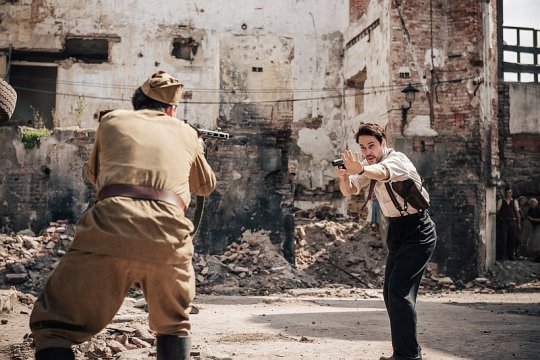
Taylor Kitsch, an actor known for his roles in such Hollywood productions as "Battleship: Battle for Earth" and "X-Men Origins: Wolverine", is starring in the new Canal + series "Defeated". In an interview, the actor reveals what he remembers from history lessons, what connects the series' story with the modern world. He also explains why, according to him, every person should visit the former concentration camp of Auschwitz-Birkenau.
Taylor Kitsch started his adventure in Hollywood as a "hottie" - an actor associated with a great body and beautiful face. All because the first role that brought the popularity of the former model Abercrombie and Fitch was the character of naughty lover Tim Riggins in the cult series "Friday Night Lights".
Kitsch did not avoid tough moments in his career - for example, when the $ 250 million John Carter, his first such big role, suffered a disgusting box office failure. But the Canadian knew this taste already - after coming to the USA, he was homeless for some time before finding a job.
For years, he has been successfully playing in big titles and alongside big names. Oliver Stone ("Savages"), Ryan Murphy ("Heart Reflex"), roles alongside Chadwick Boseman ("21 Bridges"), Michael Shannon ("Waco"), Michael Keaton ("American Assassin") and Rihanna ("Battlefield ), the HBO series "Detective," starring Vince Vaughn and Rachel McAdams. Meanwhile, Kitsch finds his way to charity, especially for children.
From 1 January 2021, we will watch him in "Defeated" . There he plays the role of Brooklyn policeman Max McLoughlin, who in the summer of 1946 is sent to Berlin, which is divided into four spheres of influence. Its task is to support the emerging police structures in the rubble. But upholding order in a space of brutality and lawlessness and clashing political forces - French, American, British and Soviet - will not be easy. Especially since Max does not know that he is used as a pawn in the game to open the Cold War, and somewhere in the maze of Berlin rubble lurks his brother Moritz, a self-proclaimed Nazi hunter who will stop at nothing ...
In addition to Kitsch, the main roles will be: Nina Hoss (local policewoman Elsie Garten), Sebastian Koch (criminal known as Engelmacher, Al Capone of post-war Berlin), Logan Marshall-Green (Max's missing brother, Moritz) and Michael C. Hall (consul Tom Franklin ).
The "Defeated" takes place in Berlin, right after the war. When you decided to play Max McLoughlin, did you have any knowledge of what the situation in Germany was like then?
The seres begins six months after the end of the war. I have the impression that this is a moment that is missing in the educational process - we learn a lot about the war itself, but about what happened immediately after it, for example, I had no idea. The plot of "Defeated" is made up, but our director Måns Mårlind (co-creator of the hit series "Bridge over the Sund") constructed it on the basis of many true stories. I have the impression that fact and fiction are perfectly balanced here. In the process of preparation, he gave us many documentaries and articles that helped to build an idea about the climate of the city from 1946. Discovering the next details of the story was fascinating for me.
Your work gives him a chance to get to know the world, its history, extraordinary places and people. Do you appreciate it?
This is the best part of my job! With each new production, I have a chance to immerse myself in its world and get to know it thoroughly. It could be a war movie like "Survivor", a story about a cult leader ("Waco"), the world of a detective ("Detective") or the beginning of the AIDS epidemic, as in "Heart Reflex". When I was an aspiring actor learning to act in New York, I never imagined that I would be able to live and work like this. Train with Navy Seals or meet Larry Kramer [American playwright, writer and activist for LGBT rights - ed.]. I am very lucky!
Prague, where you shot "Defeated", is a cult city for many Polish filmmakers, due to the famous FAMU school, but also a popular, atmospheric excursion destination. How was your time there?
Lovely. He will refer again to the privilege of working like this: six months in such a wonderful place, it is almost immoral! The only downside was the tight schedule so I didn't discover all the nooks and crannies that I had on the agenda. Fortunately, my driver, a guy in his fifties, was a great-grandfather from Prague, very talkative, and from him I learned the most interesting things - stories about the adventures of my ancestors and friends! Besides, in Prague, if you want to take a history lesson, you go out twenty meters in front of the front door - and it's already getting started. We shot in the summer, before Covid. We had an international team - Czechs, Swedes, Russians, Germans, French ... In use - not only behind the scenes, but also on the set - several languages simultaneously. Really, the only problem for me was my diet. Flour, red meat, stews ... I don't really like to eat like that. At least the beer was delicious, really amazing! In general, I really liked the culture of drinking and eating outside, these gardens, the community ... wonderful thing.
Due to the fact that the film was made in Europe, you had the opportunity to see places related to the war with your own eyes. What made the greatest impression on you?
I was lucky, although it is not quite an adequate term that during the shooting we managed to visit the site of the former Auschwitz camp. Of course I knew, I had read about concentration camps before, but this direct contact with the site was invaluable, it gave me a clear idea of what happened. It is difficult for a man to believe what he sees around him. He's standing right next to him, yet he doesn't quite believe it. The space made a huge impression on me. I did not realize how huge Birkenau was, how perfectly organized the entire extermination was. This architecture, the surrounding houses, barracks. Someone designed it, thought over the function down to the smallest detail, and during my visit, I had the chance to trace how and where the whole process took place, step by step. I was standing there and it felt like I was choking, my whole body ached. Such experiences helped me a lot to bring my character to life. Max did not survive the camp himself, but he appears in a place marked by this tragedy, the tragedy of World War II, it affects him. I wish everyone could visit this place because it is a life changing experience.
Movies set in the past can be a perfect mirror for what is here and now. What analogies do you see between that reality and today's world?
- Division, the dictate of fear, fear of the unknown, of otherness. Different ways to work through your trauma. These are all threads that connect the "Defeated" space with our reality. For my character, especially the experience of trauma resulting from family history, from the relationship with my brother, becomes the key. They both underwent a similar shock, but their reactions were completely different. I found it very interesting. Max is still hoping for a change, Moritz, as the saying goes, "the platform is gone". They have a completely different perception of one and the same event. Again, it is also a very contemporary thread - one event, situation, and extreme different opinions about it.
Your hero comes from Brooklyn, after you came from Canada, you spent a lot of time in New York. What is so special about the atmosphere of this city that gives it such a "mythical" status?
For me, it has always been, I fully agree! Scorsese's "Streets of Poverty" has always been such a cinematic quintessence of New York, with its excellent Keitel and DeNiro. This film is set in the 1940s, which is the present day of Max. He was my point of reference in terms of the accent. Those years were difficult, the inhabitants struggled to make ends meet, and that also had to affect my character's character. Besides, New York has a chic character, New Yorkers feel proud of their roots. It's also something that Max defines.
And you had to transfer this New York feeling to Berlin ...
... to the razed Berlin, which for Max becomes, in a way, another space of trauma, personal again, but this time much more intense.
For this role, you had to master not only a Brooklyn accent, but also the German language. It was difficult?
I had an amazing accent teacher from Berlin, Simone. My rock! Fortunately, Max is an American who speaks German poorly and not a German, because if I had to play a German, I would have had a nervous breakdown! German is a damn hard language, especially for someone who wasn't exposed to such sounds when growing up. I learned everything phonetically. Sometimes I was "suspended" during the scene and then I was saved by Nina [Hoss, a great German acting and screen partner of Kitsch - ed.]. In my career, I have had to play with a South African, Texas, New York accent ... I've learned that there is no such thing as an optimal effect, someone is always dissatisfied. I focus on the vision agreed with the creators and I stick to it. Language is an amazing link between the actor and the protagonist, gives a unique insight into his state of mind and view of the world. I definitely prefer to play the character with an accent than to speak as usual. It's a great transformation tool. The arrangement of the lips, the appearance of the face, and the term are changing. In "Waco" my character, the guru of the sect David Koresh, had an unnaturally high, soft voice, which immediately made the viewer feel differently.
We associate you with American hits, but you are, like Ryan Reynolds or Ryan Gosling, Canadian. Do you feel like an American, or is Canada a state of mind after all?
I started my adventure with the USA when I was 20, I came to school. Now I'm forty, so I've spent half my life here. Madness! Over time, I have grown into this space, I have settled down and I feel at home. I'm talking to you from my home in Austin, Texas. But at the same time, I'll always be Canadian. I go there often, visiting my family and familiar places. Maybe I'll go back one day, who knows?
You've had moments in your career that turned from a promise of triumph to failure, such as the high-budget John Carter, who failed at the box office. Do you have something that you already know: "I'm avoiding this"?
I don't have things that, as a rule, I don't do or know that I will never do. But there are some that I don't like. These include radical weight changes. My dear friend must have gained twenty-five kilos for a small, independent film. The first week was great because you eat what you want, then depression started, joint problems, sugar jumping ... I never put my back, but I lost weight. I lost a dozen kilos for the role in "Waco", before that for the "Bang Bang Club". It's fucking hard and very exhausting, especially the older I get. My body and head hate it! Also, until Scorsese calls with some great proposal, I say: enough.
16 notes
·
View notes
Text
Thresholds, Online Exhibition Review
@ MIMA, Middlesbrough Institute of Modern Art
At the start of the year we were fresh-faced, coming into a new decade our planners were full and the air was ripe with potential. Then we entered the period of uneasiness, stuck at home not knowing what was going to happen next, our plans stifled; the places we once went for enjoyment and culture were shut and at risk of closing for good. In this period of uncertainty, we connected to the outside world via our screens, seeing family and friends in unfocused zoom calls and trying to figure out the best impromptu office space to work from home in. We spent more time in our domestic spaces, saw into the domestic worlds of our peers, lines were crossed as our domestic spaces became where we entertained friends, where we worked and where we also relaxed on top of everything. Our relationships with our homes we re-written as we adapted to our new way of living through a pandemic.
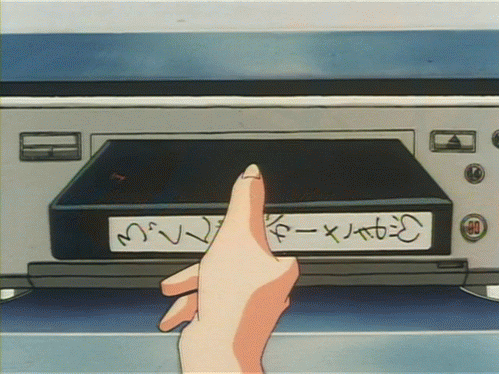
Throughout lockdown, art spaces jumped to create online exhibitions right away and created a plethora of virtual exhibits some newly made others pre-planned exhibits put into a computer manufactured gallery space or a video tour like Tate Modern’s Andy Warhol exhibit. Comparatively, Thresholds curator Adian Moesby, who is currently working as MIMA’s associate curator during his residency, took time to reflect on the changes made to our relationship with home during lockdown and the easing of restrictions which is where this current virtual exhibition is born out of. Moesbys practice is ‘under pinned through conversation’ (Adian Moesby – About, 2020) which he utilises in the curation of this exhibit through in-depth conversations he had with Sonia Boué, Lindsey Duncanson and Catriona Gallagher, the three artists that make up Thresholds. The exhibit connects these artists together through a mix of photography and film to communicate their personal stories and experiences with lockdown and the impact Covid-19 had on their relationship to home. Made at a time of easing restrictions Thresholds asks us to evaluate our feelings and connections towards our homes and the places we inhabit at a time where restrictions are tightening up once again and we will inevitably be spending more time there.
Clicking through to the exhibit PDF you are confronted with a low-res still from Catriona Gallagher's ‘Video Villanelle (for distance)’ (2020), a twilight sky setting up the transient mood that prevails throughout the exhibit. Scrolling down you are introduced to Sonias Boué’s ‘Safe as Houses’ (2020) 12 photos documenting her move to her new studio space which she moved into during the transitional period of lockdown. Set against a white backdrop each new photo exists on its own page and explores a plethora of objects which Boué takes with her for each new move; from childhood items such as a rocking horse to an exhaust pipe situated on its own rickety looking chair, these hold a personal connection to the artist. ‘Safe as Houses’ shares a close relationship to much of Boué’s practice where she ‘explores home and the domestic as metaphors for exile and displacement’ (Sonia Boue, 2020) with much of her work focusing on post-memory the idea of connection to the past and the generational trauma that continues to affect the lives of future generations seen most clearly in her work responding to the Spanish Civil war. Boué presents this within Thresholds in the specifically tailored striped pyjamas featured in a quarter of the photographs that connect not only to the new casualwear of lockdown but is reminiscent of the clothes her grandparents were forced to wear during their time in concentration camps. In one they sit folded on a wooden chair set to the right of the frame; the room dim with a square of light reflected in from a window in the empty space. Boués photos mark the space of time from childhood to adulthood and the period of moving. The photographs and the diverse objects we see serve as an exploration into what home means to us, the things we carry through with us through childhood into our adult lives and how we make a space a home.
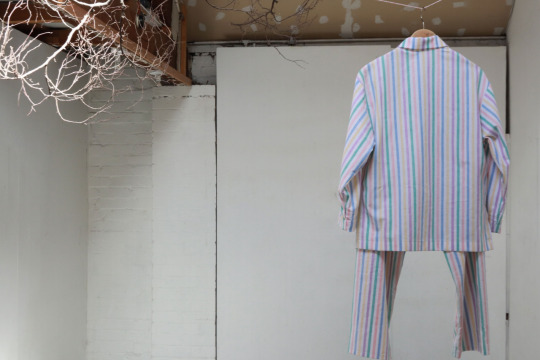
Sonia Boué, 'Safe as Houses', 2020.
Where Sonia Boué travels through memories and explores the past, Lindsey Duncansons piece ‘Brief loss’ (2020) studies the repetitive stagnation of life during lockdown. The three greyscale film vignettes feature next to each through a triptych; filmed within Duncanson's own flat it reveals a very personal side to the artist and invites us into her own domestic space that she shares with her family. The film is notably different from the rest of Duncanson's work which usually feature sublime picturesque outdoor scenes with plenty of colour whereas in this piece she has swapped out the rolling hills of the moors of Stanhope for the cosy interiors of home. This reversal exemplifies the loss, change and confinement that lockdown brought, Duncanson can no longer explore the landscapes around Newcastle upon Tyne and so she has adapted to her new situation and uses her home as a landscape to explore instead. Titled ‘Brief Loss’ the piece carries with the emotional effects of lockdown and displays the monotonous nature of life that occurred when we could no longer go out to experience life outside our homes. Within the scene Duncanson sits crouched in the centre of the triptych, walled in by a row of plants and a bookcase she’s seemingly lost in thought, occasionally picking a book out and flipping through it before resuming her previous position, there is a quiet comforting presence to the piece, on either side of Duncanson her partner, in the left-hand panel, and son, in the right, sit in their own respective rooms, her partner rests comfortably on an armchair occasionally living his mug while her son sits at his desk drawing while a screen flickers out of signal next to him. The whole scene has a dreamlike quality to it with the comfortable atmosphere alongside the ambient sound and the black and white filter and in each doorway behind the subjects exists projections of the outside, with pond skaters skipping over water, the ripples and reflections of clouds, and star-like moving foam. Duncanson combines the domestic with the outside showing our dreams of being free once again and escape this monotony that we’ve fallen into.
The final piece of Thresholds isn’t confined to the comforts of home or one space instead it travels through memories, moments and landscapes. Home isn’t one pace for most of us but for Catriona Gallagher she works and lives between Northumberland and Athens ana through ‘Video Villanelle (for distance)’ (2020) she ‘explores her sense of dislocation’ (MIMA-Thresholds-Exhibition.pdf, 2020) from being stuck in England while trying to navigate the travel restrictions throughout summer to return to Greece. The aptly named 17-minute film follows the a, b rhyme structure -like that of a traditional villanelle poem- comprised of short snippets of footage with repeating motifs not too different from the structure of a stanza. The footage feels as though you are being invited into Gallagher's life, it’s a documentation of scenes with friends, with so warm sparkling candles on a birthday cake and to late-night bicycle rides, to rain pouring outside of a window and Gallagher's reflection in the window of a train the landscape rushing by while you hear mindless chatter in the background. Sound plays an interesting role in this film with most of it coming from the footage though you can hear music from Magic Arm ebbing and flowing through that perfectly ties the clips together. There is a sense of reminiscing over what life used to be with clips featuring a close-knit group of people and scene of the Greece coastline this is starkly contrasted to the reality of uncertainty as to when life will return to normal. The film is set in portrait mode with a somewhat low-quality feel to it due to the footage being taken entirely from existing videos from Gallagher's phone archive. It comprises of videos sent to friends or keepsakes as Jade French puts it ‘this footage was never intended to be art’ (French, 2020) which give it an intensely personal feel as if we are walking through her memories. ‘Video Villanelle’ focuses on the small moments, the subtle experiences in life and though the footage is fragmented it still carries the same focus on overlooked details in our physical spaces and ambient wistful nature that Gallagher's work holds. Gallagher uses this piece to reflect on their experience of lockdown and looks at how our phones connect while improvising with the limited tools she had available as she did with ‘They met under the ceiling of sky’ (2020) which then went on to the official selection in the Laterale Film Festival in 2020.
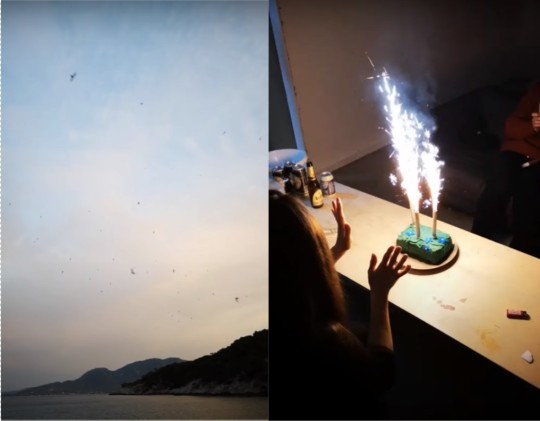
Catriona Gallagher, Stills from ‘Video Villanelle (for distance)’, 2020
Over the summer we have been overrun with the many virtual exhibits and Thresholds taking place after utilises the online space to its best potential. Having been commissioned to be a virtual exhibition it uses photography and film which are familiar to the online space rather than creating pieces tailored to a physical space. Through working online there’s a variety of different experimental formats to use over a simple pdf format however this way it encourages a non-art audience to take part through being simple, it becomes relatable for a wider range of people which Moseby advocates for having curated public events to specifically engage those audiences.
Thresholds subliminally speaks on the visibility of the disabled community in the art world. Curator Aidan Moseby closely works within the disability and diversity sector having been commissioned by and worked for companies such as Disability Arts Online and DASH which this exhibition is partnered with. The setup and extra care with subtitled and audio described versions for each film make this exhibition more accessible the usual cases. Where other galleries are immediately setting up shop in their physical spaces' as lockdown eased Thresholds doesn’t, it makes a statement that we can’t forget that the move to virtual during lockdown made art spaces more accessible to the disabled community. Art spaces have long been exclusive and inaccessible but with the lockdown when non-disabled people no longer had the means to visit gallery spaces that suddenly changed. It showed that galleries had little excuse for doing this before with the ease and speed in which they transferred their exhibitions online. Even having a virtual floor plan makes it more accessible as they ‘act as a helpful tool to plan trips and relieve anxiety for disabled art audiences’ (Kroese, 2020) referencing 3d art space floor plans.’. Thresholds subliminally makes a statement through being set after many galleries have shut their online exhibits and have opened their doors again through quietly having accessible versions of artworks. There is much change that needs to happen in the art world in making it more accessible to a wider range of people and lockdown has presented these options that we can and should learn from to aid us in the future.
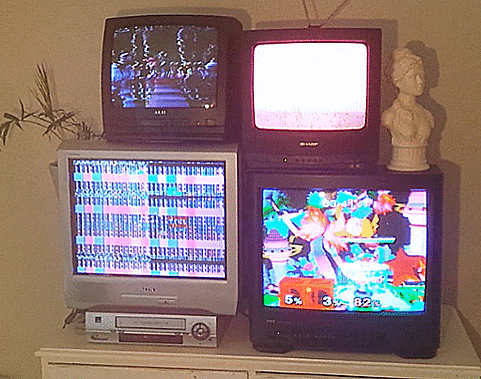
Thresholds invades your domestic space as you visit it through the comforts of your own home through the ambient sound of Gallagher's work and personal memorabilia of Boués photographs. It looks at how the pandemic has changed our relationship to our domestic spaces, how confined we've become and how the virtual space can connect us. As lockdown has pushed and eased our homes have become multi-functional places, we continue to reflect on the change our lives have gone through and think about our connection to the people we surround ourselves with. Though through this we need to see the visibility of disabled people in the arts and how the small start that was ignited during lockdown needs to continue to help keep places accessible to the many rather than the few.
Thresholds can be found here.
Bibliography
Mima.art. 2020. MIMA-Thresholds-Exhibition.Pdf. [online] Available at: <https://mima.art/wp-content/themes/mima-wp/media/MIMA-Thresholds-Exhibition.pdf> [Accessed 21 October 2020].
French, J., 2020. Thresholds. [online] Corridor8. Available at: < https://corridor8.co.uk/article/thresholds/ > [Accessed 22 October 2020].
Aidan Moseby. 2020. About. [online] Available at <https://www.aidanmoesby.co.uk/contact-us/ > [Accessed 22 October 2020]
Duncanson, L (2020) ‘Quarry’, Blue Topgraphy, 27 January. Available at: < https://bluetopography.blogspot.com/2020/01/quarry.html> (Accessed 23 October 2020)
Kroese, I., 2020. Emerging Accessibility: Post-viral programming and disabled audiences. [online] Corridor8. Available at: < https://corridor8.co.uk/article/emerging-accessibility-post-viral-programming-and-disabled-audiences/> [Accessed 23 October 2020]video
#thresholds#MIMA#Aidan Moseby#Catriona Gallagher#Sonia boue#Lindsey Duncanson#Lockdown#Exhibition Review#Review#Art#home#disability arts#accessibility#art spaces
3 notes
·
View notes
Text
Gochiusa BLOOM episode 3 impressions
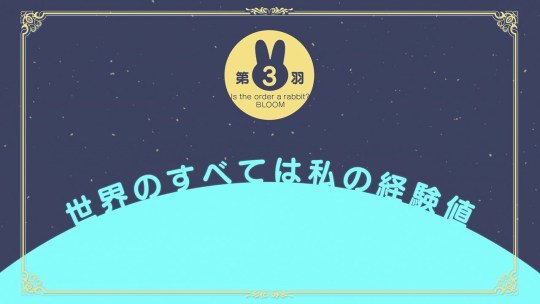
Previously: episode 2, episode 1 (seriously, the number of notes on ep 2 review is too low...)
Welcome to another review of Gochuumon wa usagi desu ka? BLOOM. In this episode, the series explores a topic it rarely touched previously, which is school life. Unlike many similar slice-of-life series, Gochiusa rarely concerned itself with such a mundane setting, preferring the ambience of cafés and cobblestone streets. There were a few exceptions, such as the first half of season 2 episode 10, but this is the first episode fully dedicated to a school setting.
Another distinguishing trait of Gochiusa is that the group of main characters attends not one, but several different schools. In particular, there are two high schools: a “normal” one attended by Cocoa and Chiya, and an “elite” one attended by Sharo and Rize. Moreover, there’s a group of middle school characters on the verge of graduating. As such, the question of which high school will Chino, Maya and Megu eventually choose was bound to come to the forefront at some point. And that’s exactly what happens in this episode.
There’s a lot of interesting stuff to discuss, so let’s get down to business...
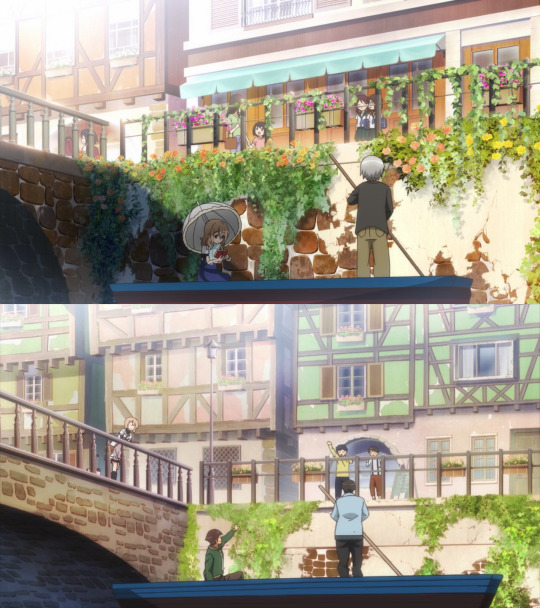
The episode opens with a shot of Aoyama Blue Mountain on a boat, which also appears in the beginning of season 1 episode 1. By the way before COVID you could totally ride a boat like this in Colmar. Just watch your head...
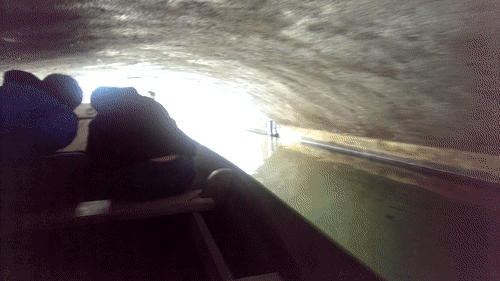
Yeah, this is under the bridge from season 2 ED. Filmed by me.
Anyway, I’m being sidetracked. What’s important is that this is the only shot where you could tell it’s morning, because of the angle of the shadow from the bridge. It is indeed morning, and we see Cocoa and Chino walking down to school. Seems the summer vacation is over and it’s already September? Cocoa, the self-described pikka-pika no onee-chan, tries to coerce Chino into committing to enter the same high school as her, while Chino is not sure about that. We’ve seen Chino being unsure about her future as recently as this season’s episode 1, and in regards to the high school choice the time for a decision is quickly approaching.
Soon we see Maya and Megu who are facing the same decision. Megu seems to have already decided on what Maya derisively calls the gokigenyo school. The greeting gokigenyo (ご機嫌よう) comes from the word “kigen” (機嫌) which means “mood”, and can be literally translated as “how do you do”. However the same word is also used as farewell, which often causes troubles for translators.
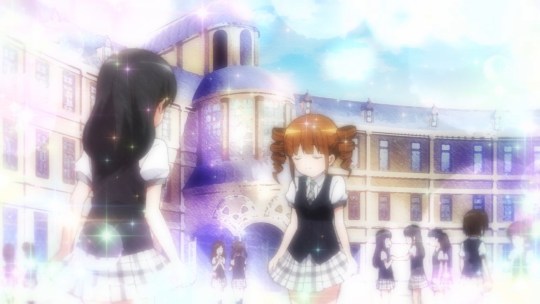
The concept of “gokigenyo school“ has been popularised by the light novel and anime series Maria watches over us (Marimite), which is also one of the most influential works of the yuri genre. This concept has also been parodied a number of times, for example in the excellent episode 5 of Flip Flappers.
Megu manages to convince Maya and Chino to come with her to a tour of this school, and we get a close-up of Maya hinting that she’s definitely hiding something.
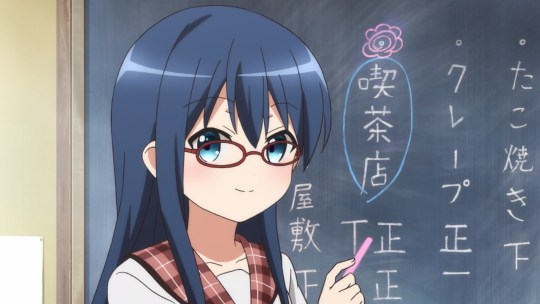
Meanwhile at Cocoa’s school, the class president declares the theme of the cultural festival being “cafe”, and puts Chiya and Cocoa in charge of it, because they work at a cafe. It seems that Chiya is considered to be more dependable than Cocoa by her classmates, since she got a higher rank. Nevertheless, it is Cocoa who mostly delivers the speech to fire up the other students.
Note the usage of Chinese tally marks to tally the votes. The five strokes comprising the character 正 (”truth”) equate 5 votes. This method is popular across East Asia, even in Korea where Chinese characters are no longer used.

Also I’ve seen a lot of people were confused by the inclusion of “sex museum” as one of the proposals, which is how 秘宝館 (hihokan) has been translated by the official subtitles. This word, which literally means “the hall of hidden treasures” has been used by various establishments of this type in post-war Japan, however only few of them remain open now. I think “sex museum” is a bad translation because, while technically correct, it breaks mimesis, or in simpler terms, immersion. The English translation is so blatantly inappropriate that it would never make it onto this blackboard, whereas the Japanese word is obscure and innocent-looking enough that it just might. A better translation would be “adult museum”, in fact that’s what the most well-known hihokan, Atami Hihokan uses for its English title.

As proof of each other’s ability, Cocoa mentions Chiya’s triple tray wielding skill (お盆三刀流 obon santoryu) which has been demonstrated in season 2 episode 1. Chiya brings up Cocoa’s “basking in the sun” (日向ぼっこ hinatabokko) attitude which supposedly makes her popular among customers. This is a reference to season 2 episode 5 where Rize says Cocoa always either practices latte art or basks in the sun.
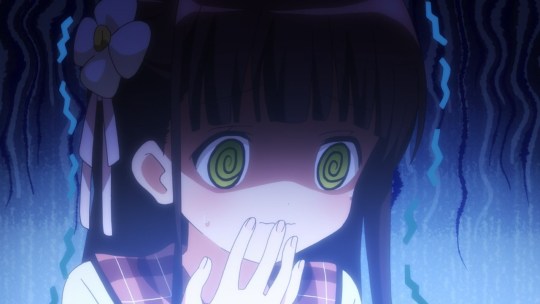
On the way back from school, we learn that Chiya is actually scared of the responsibilities placed on her, and her dream of becoming the president of Ama Usa An franchise (which has been mentioned in s2e1, s2e9 and maybe other episodes I forgot) might be ruined because of this. Cocoa consoles her, again showing her motherly side.
Back at Rabbit House, Cocoa explains how the upcoming festival will be exciting (wakuwaku) and fluffy/cuddly (mofumofu). This is one of several times Cocoa uses silly onomatopoeia to describe something in this episode (aforementioned pikkapika onee-chan and describing her school also as mofumofu in a latter scene). Interestingly, all of these lines are anime-original, and at this point seems like an intentional effort to make Cocoa speak in a more eccentric manner.
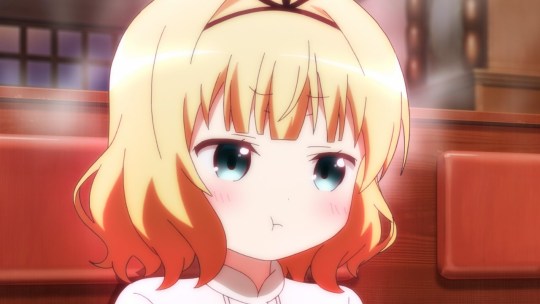
In the next scene Sharo becomes angry at Chiya for keeping secrets from her, and blows her cheeks, which makes her turn into a Fugu fish, according to Chiya. Fugu is famous in Japanese cuisine for being a highly poisonous but sought after delicacy, however in this case the comparison has to do with the tendency of a live fugu (as well as other pufferfish) to inflate its stomach, giving it an almost spherical appearance to deter predators.
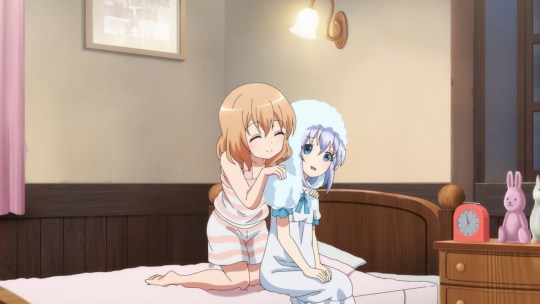
Next there’s another anime-original CocoChino scene where Chino asks Cocoa about what her school is like. This is my favorite part of the episode because it’s just so adorable. Like, even the fact that Cocoa is drying Chino’s hair with a towel after bath shows how close they became. The direction and the delivery of the dialogue is masterfully executed. Cocoa would be really hurt if Chino chooses any other school, and Chino knows that. But Chino can’t admit she’ll choose her next school because of Cocoa, at least not yet.
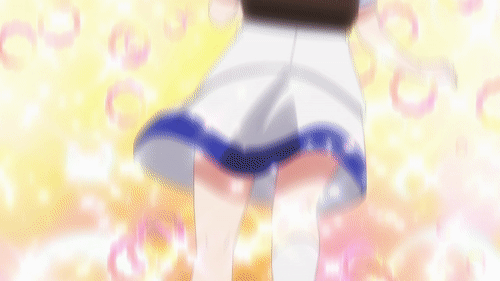
Now we move on to the main plot of the episode, which is Chimame visiting Rize and Sharo’s school. Like I said in the preview, this episode covers chapters 10 and 11 of the volume 5 of the manga, which in-universe occur at the same time. However while it fully covers (and has the same title as) chapter 10, only the first half of chapter 11 is included. So about 2/3 of the episode are dedicated to the story of chapter 10.
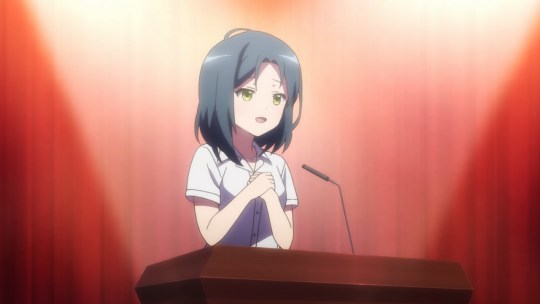
Chimame attend a speech by “OG” Mate Rin. OG in this case doesn’t mean “original gangsta”, but “old girl”, which is a Japanese term for female alumni of some school (there’s also OB for men). Chino recognizes Rin as the editor of Aoyama Blue Mountain, and I’m not sure if Maya and Megu ever met her, so they don’t. When Rin recalls a senior who turned her life around, Chino recalls her chance meeting with Cocoa. In particular the phrase deai ga taisetsu (”chance meetings are to be cherished”) sticks with her. On the other hand, Maya seems to be interested in the fact that Rin was recommended for scholarship. Interestingly in the manga, Maya slept through most of the speech.
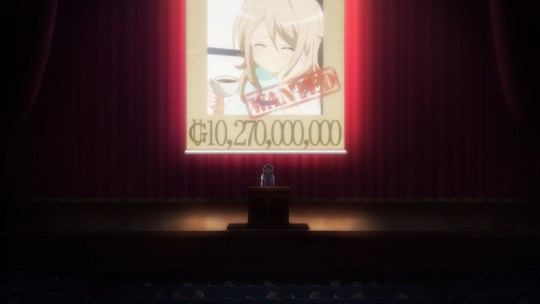
The senior Rin was talking about was obviously Aoyama and we see that there’s actually a huge bounty placed on her. The currency sign consisting of combined letters G and U wasn’t seen before, with prices usually displayed in yen, but there was a Euro-like sign at an open market at the beginning of season 2 episode 1, which might be a shorthand way to write GU. Either way this currency must have a serious hyperinflation problem as the reward for finding Aoyama exceeds 10 billion GU. In countries affected by hyperinflation, a stable foreign currency is often used to perform economic transactions, which might explain why most of the prices are in yen.
But is there some significance to this exact number? Why, yes, 10/27 is Aoyama’s birthday! It is also the start of “reading week”, which actually lasts 2 weeks, until November 9.
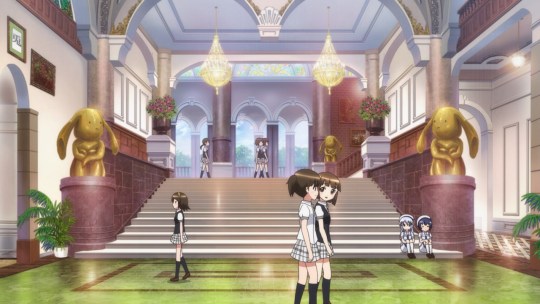
After the speech Megu gets separated from the rest of the group, and the other two also get lost in the vast campus of the school. As seen from the above interior shot of the school, it is also inexplicably rabbit-themed (or maybe just this particular hall is), with golden rabbit statues and also a picture on the left wall with the kanji for rabbit (兎).
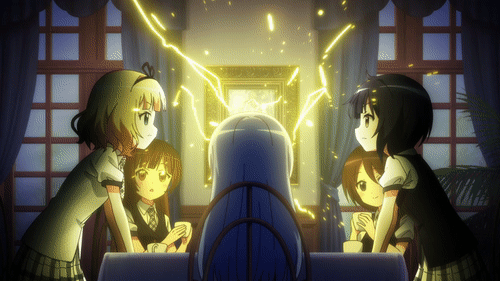
Through a series of misunderstandings Chimame end up infiltrating the school with Sharo and Rize providing uniforms for them to blend in. Despite having trouble to behave “ladylike” before, Maya naturally blends in once she treats it as a game, and even gets invited to a tea party. She makes a mistake though by mentioning moyashi (bean sprouts) which is considered a cheap and low-class food, but she’s saved by the fact that the rich girls don’t even know what that is, and Sharo explaining how to prepare it in a fancy way.
Eventually the groups meet each other and Maya reveals she has been recommended for scholarship due to her good grades. Perhaps she also treated her school grades as experience points to gain, as the title of the episode (and the manga chapter) ”The whole world is my experience points” seems to suggest. This is the idea behind a real concept of gamification, by the way.
There’s also a callback to the season 2 episode 8, where Maya asks Rize for advice while Chino and Megu are spying on her. It is worth to rewatch that scene, because it’s full of foreshadowing for this episode. Back then Maya thinks she’s the only one of the three to go to this school, but now she thinks there’s a good chance all three will still go to the same school. Chino doesn’t seem to feel this way though.

In the end we see Cocoa and Chiya joining the group, also wearing the elite school uniforms, which is briefly explained by them gathering supplies for the cultural festival. I guess the next episode will explain how they ended up there. In the manga even the fact that they have a cultural festival wasn’t revealed until this point. Also in the manga fukiya club president, Karede Yura, inexplicably appears for just one panel so that Cocoa and Chiya could thank her, without any lines. In the anime she appears just as (if not more) suddenly, however there’s some foreshadowing with her inviting Rize to a tournament earlier, and she gets quite a few speaking lines.
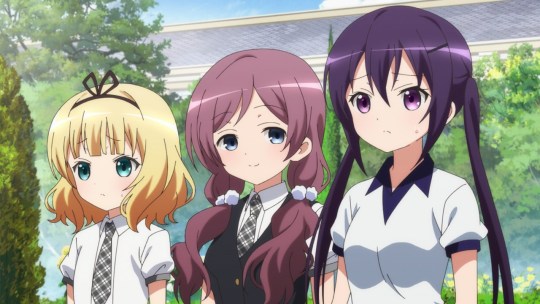
If you listen closely there’s a funny sound effect as she looks at Rize, and then at Sharo. I really liked her design since her first appearance in the manga, and Koi probably does too, as her role has greatly increased in the recent chapters. Consequently her single-panel background appearance has been expanded as well in this episode, she got her full name mentioned in the credits, and there’s even a Karede Yura character song included on the second BD volume (which includes this season’s episodes 3 and 4). All things considered, I fully expect Yura to appear in the episode 4 as well.
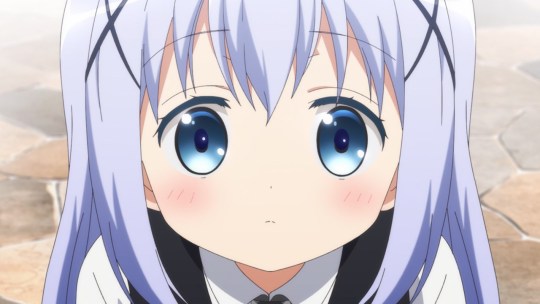
The episode ends with Chino looking at the sky with a worried expression. It just hit her that both Megu and Maya are going to a different school than she is expected to go to. As Megu and Maya have a clear path forward, Chino’s future has become even more uncertain, and she feels like the odd one out in the group. Now the part of the ending where Chino is suddenly alone makes sense:
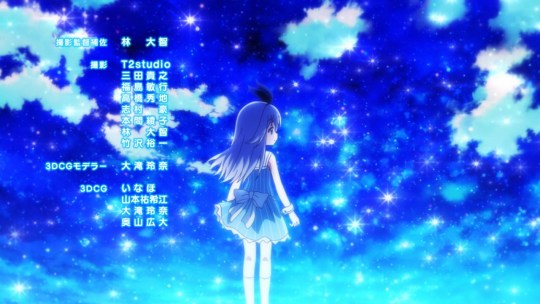
this is basically her imagining the future where Maya and Megu leave her. The coffee cup transition symbolises Chino waking up and seeing that MaMe are still her friends and aren’t going anywhere. We’ll see though...
This time it’s Megu doing latte art in the ending, and the picture is of Chino and Maya dancing. The weird thing is, Megu wasn’t even present at this scene, so how did she draw it in such detail?
Also another random fact I noticed: Chino’s Alice costume actually appeared in the opening of both season 1 and season 2. Here’s a comparison for reference:
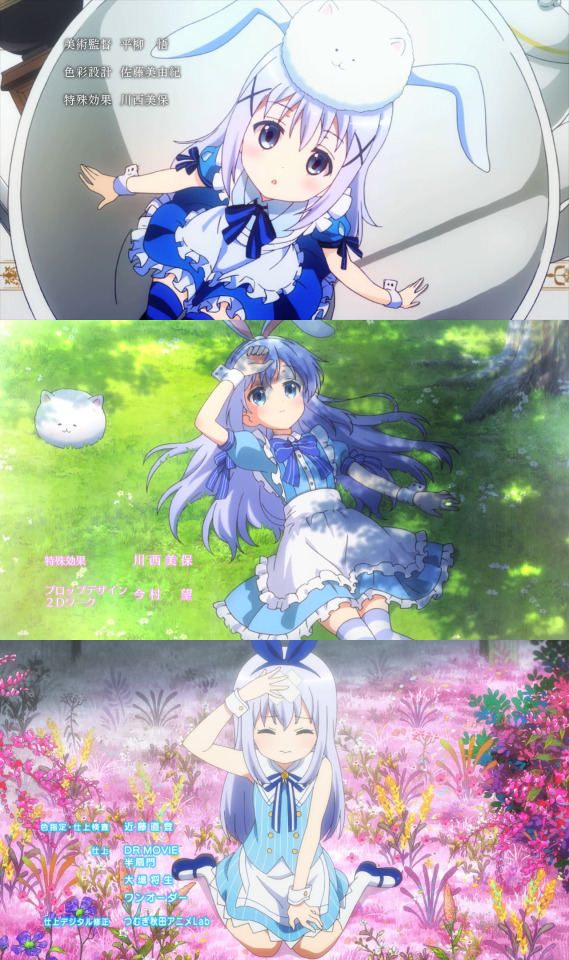
Anyway, that was the third episode of Gochuumon wa usagi desu ka? BLOOM and I hope you enjoyed reading my review. See you next week... or so.
10 notes
·
View notes
Text

In this Pandemic, all of us was suffering when it comes to education. We are experiencing struggles about learning and how do we passed our grades when it is online.
We don't know what will happen to our grades for the following days. We must not make fun to the pandemic we experience in these days.
ADVERTISEMENT
I woke up an hour late Wednesday morning, and by the time I had thrown on a sweatshirt, prepared my glass of Emergen-C, and logged onto Zoom, my class had been going on for 15 minutes. The night before I had taken cough syrup for my seasonal cold, and this was the first day my school switched to virtual instruction. Over the course of the three-hour workshop, I noticed my puffy eyes on the panel of faces and became self-conscious. I turned off my video. I became distracted with the noise of sirens outside and muted my speaker, only to then realize: by the time you’re done muting-and-unmuting, the right moment to join the conversation has already passed. I found myself texting on my computer, stepping away to make coffee, running to the bathroom, writing a couple e-mails, and staring at my classmate’s dog in one of the video panels. I don’t think my experience is unique; I imagined similar situations playing out in virtual offices and classrooms across the world.
In the aftermath of the World Health Organization’s designation of the novel coronavirus as a pandemic on March 11, universities across America are shutting down in an attempt to slow its spread. On March 6, the University of Washington took the lead, canceling all in-person classes, with a wave of universities across the country following suit: University of California, Berkeley, U.C., San Diego, Stanford, Rice, Harvard, Columbia, Barnard, N.Y.U, Princeton and Duke, among many others.
This shift into virtual classrooms is the culmination of the past weeks’ efforts to prevent COVID-19 from entering university populations and spreading to local communities: cancellation of university-funded international travel for conferences, blanket bans on any international travel for spring break, canceling study-abroad programs, creating registration systems for any domestic travel.
ADVERTISEMENT
Columbia University, which I now attend virtually, moved all classes online starting on March 11. The following morning, president Bollinger declared that classes would be held virtually for the remainder of the school year, and suspended all university-related travel; both international and domestic. The pandemic has affected over 114 countries, killing over 4,000 and shows no sign of abating, leading to chaos in university administration and among students. I find myself obsessing over my family in Japan, especially my mother, whose lung cancer puts her at particular risk. Cancellations are affecting future students as well—admitted students’ events, open houses, and campus tours are all being canceled to minimize contagion.
The quick turn to platforms like Zoom is disrupting curricula, particularly for professors less equipped to navigate the internet and the particularities of managing a classroom mediated by a screen and microphone. I had professors cancel class because they had technical difficulties, trouble with WiFi, or were simply panicked over the prospect of teaching the full class over the new platform. With university IT services focusing efforts on providing professors with how-to webinars on using online platforms, individual student needs for these same services have been placed on hold.
While the initial shift online has created a flurry of chaos, there are benefits to a virtual classroom. Especially in a place like New York, students can continue participating in discussion sections and lectures without riding the subway for an hour, avoiding the anxiety of using public transit or being in other incubators like classrooms, public bathrooms and cafeterias. Students can “sit in” on a class while nursing a common cold or allergies that come with the season, but which can make students a target of serious threats or violence—particularly racialized harassment for Asians. I have found immense relief in not having to pay for Lyfts to campus, avoiding side-eyes for my runny nose or using the little remaining hand sanitizer I have left after holding subway poles. In some situations, online teaching may not even affect student behavior or learning. Studies have shown that medical students learn and perform equally in live versus recorded lectures, and these results are reassuring at a time like the COVID-19 outbreak.
However, the reality is that some subjects are much harder to transfer online. A biochemistry or introductory economics lecture is easier to teach virtually than a music or dance class. The creation of a film or theatrical production requires physical bodies in close proximity. Even in my creative writing workshop, responding to a colleagues’ memoir about her mother’s death is hard to do without looking her in the eye. The screen creates an emotional remove that makes it difficult to have back-and-forth dialogue between multiple people, and it’s almost impossible to provide thoughtful feedback without feeling like you’re speaking into a void.
Over the last few decades, online learning in higher education has been studied extensively. Online MBA programs are on the rise, perhaps unsurprising for a field that often requires virtual conferencing and remote collaboration. Universities now offer online master’s programs to accommodate full-time work and long commutes, or to circumvent the financial barriers of moving to a new location with family. Online bachelor’s degrees are offered by a growing number of schools: Ohio State, University of Illinois Chicago, University of Florida, Arizona State, Penn State and many more. The benefits are the same: classes can be taken anywhere, lack of commute offers more time for studying or external commitments, and the structure is more welcoming to students with physical disability or illness. And yet, online learning hasn’t threatened the traditional model of in-person learning.
ADVERTISEMENT
A large part of this can be attributed to accountability. Online classes require significantly more motivation and attention. I found it difficult to focus on a pixelated video screen when I could browse the internet on my computer, text on my phone, watch TV in the background, have one hand in the pantry, or just lay comfortably in my bed. The problem, too, is that webinar technology doesn’t quite live up to the hype. Noise and feedback—rustling papers, ambulances, kettles, wind—make it impossible to hear people talk, and so everyone is asked to mute their microphones.
But muting your audio means you can’t jump into a conversation quickly. The “raise hand” function often goes unnoticed by teachers and the chat box is distracting. Sometimes the gallery view just doesn’t work, so you’re stuck staring at your own face or just two of your eighteen classmates. It also means another hurdle for those who hesitate to speak up, even in the best of circumstances. It means you’re just one click away from turning off your camera and being totally off the hook. In an online class over the summer, I once watched a woman—who forgot her camera was still on, though she was muted—vacuum her entire kitchen and living room during a seminar.
In a recent New York Times article, columnist Kevin Roose wrote about his experience working from home while quarantined after COVID-19 exposure. Roose, once a remote worker, cites studies that suggest remote employees are more productive, taking shorter breaks and fewer sick days. But he also writes extensively about the isolation and lack of productivity he feels: “I’ve realized that I can’t be my best, most human self in sweatpants, pretending to pay attention on video conferences between trips to the fridge.” He notes that Steve Jobs, who was a firm believer in in-person collaboration and opposed remote work, once said, “Creativity comes from spontaneous meetings, from random discussions. You run into someone, you ask what they’re doing, you say ‘Wow,’ and soon you’re cooking up all sorts of ideas.”

Sign up for Scientific American’s free newsletters.
Sign Up
In educational settings, creativity is arguably one of the most important things at stake. The surprises and unexpected interactions fuel creativity—often a result of sitting in a room brushing shoulders with a classmate, running into professors in a bathroom line, or landing on ideas and insights that arise out of discomfort in the room. This unpredictability is often lost online.
In the essay “Sim Life,” from her book, Make It Scream, Make it Burn, Leslie Jamison writes about the shortcomings of virtual life: “So much of lived experience is composed of what lies beyond our agency and prediction, beyond our grasp, in missteps and unforeseen obstacles and the textures of imperfection: the grit and grain of a sidewalk with its cigarette butts and faint summer stench of garbage and taxi exhaust, the possibility of a rat scuttling from a pile of trash bags, the lilt and laughter of nearby strangers’ voices.”
ADVERTISEMENT
Classrooms offer these opportunities for riffs and surprise, and a large part of being a student is learning to deliver critique through uncomfortable eye contact, or negotiating a room full of voices and opinions that create friction with your own. When I Zoomed into class from my apartment, I missed being interrupted by classmates who complicated my ideas about a poem or short story. I missed being in workshop and bouncing ideas off of each other to find the best structure for a piece. I missed handwritten critiques, and felt limited in Word: no check pluses, no smiley faces, “Wow” feels flat when it’s not handwritten in the margins, and "Great" feels sarcastic in 10-point Calibri. I was frustrated that I could sleep in because online class meant I could wake up five minutes before class and pretend like I’d been ready all morning.
The COVID-19 pandemic will likely continue presenting challenges beyond those that come up in the course of routine virtual education. Even if this viral spread subsides, or a vaccination becomes readily available, the shift from online classes back to in-person learning may create disruptions of its own—adjusting back to higher standards of accountability, weaning off of phone-checking habits, and transferring comments back to hard copies instead of digital notes. Hopefully, these phases of trouble shooting can provide universities, professors and students the opportunity to practice adaptability, patience and resilience. And hopefully, these experiences will serve as preparation for future challenges that come with the next epidemic, pandemic and other disaster.
For now, I am trying to not look at myself in the gallery of faces, stop being distracted by my expressions, resisting the impulses to check my phone or e-mail, or at least recognize these urges when they arise.
2 notes
·
View notes
Text
MJJNews Provided By Anji~Justice240
MJJNEWS, PICKING -UP- WHERE WE LEFT OFF…
In Loving Memory Of Michael Jackson 1958-2009
♥ You Know That L.O.V.E. Survives ♥
** ♥ So We Can Rock Forever ♥ **
★January 2021★
MJJNEWS, PICKING -UP- WHERE WE LEFT OFF…
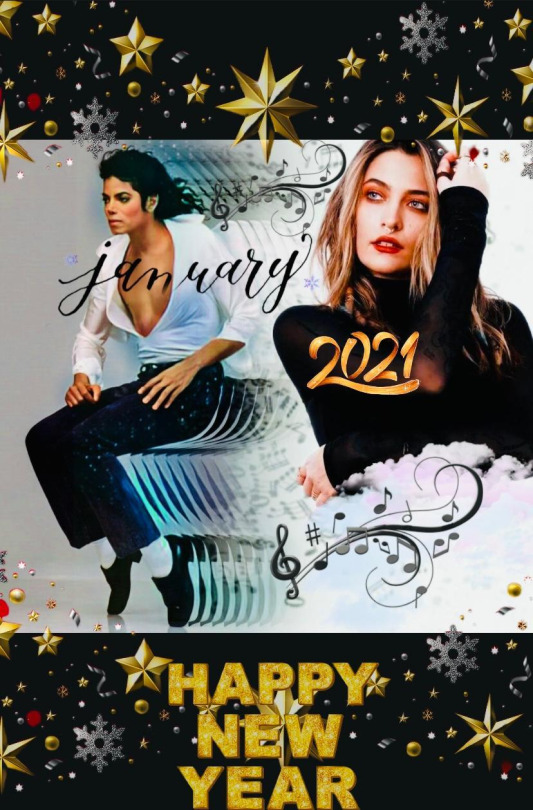
MICHAEL JACKSON – 2020 YEAR IN REVIEW
January 1, 2021
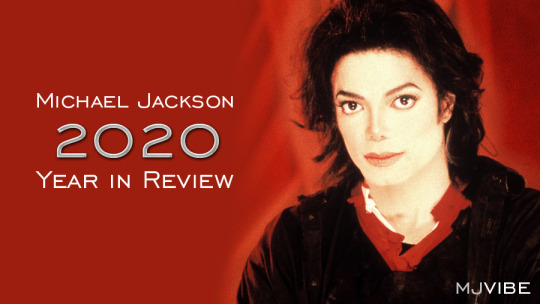
If someone had told you at the beginning of 2020 that the year was going to be spent mostly at home and online, you’d probably have laughed it off. However, in arguably the most challenging year of our lifetime, that’s exactly what happened. Thankfully, we’re fans of the King of Pop and that means that no matter where you are in the world, you’re part of an active community that engages fans and always finds ways to celebrate no matter how challenging.
So, before we turn the page to 2021, Here is MJVibe’s top picks for Michael Jackson 2020 – Year in Review!

Thriller appears in the Top 10 vinyl sales of the decade in the United States at number 6, having sold 334,000 copies between 2010 and 2019. In 2019 alone, 88,000 copies of Thriller on vinyl were sold across the U.S.

A pair of Louboutins designed exclusively for Michael to wear during ‘This Is It’ go on display in Paris France at the Palais de la Porte Dorée as part of an exhibition focusing on the world-famous designer Christian Louboutins. The sparkly shoes offer a subtle nod to Michael’s Triumph/Off The Wall look and were displayed as if Moonwalking.

- Bad in Wembley and Dangerous Live in Bucharest are once again made available for streaming on YouTube through Michael’s official channel in an effort to encourage the ‘stay home’ order given to countries around the world.
- After 11 years at the Lyric Theater, Thriller Live closes its doors for the final time. The show had been scheduled to complete on April 26th 2020 and leave the Lyric to find a new home. However, the UK-wide lock down as a result of the pandemic saw the show close earlier than planned.
- The MJ Estate donated $300,000 to Corona Virus relief efforts in Michael’s name. Broadway Cares, Three Square Food Bank (Southern Nevada’s largest hunger-relief organization) and MusicCares each received a $100,000 donation.

The Estate release ‘Heal The World 2020’, a new short film to accompany Michael’s 1992 hit of the same name. The film focused on the Covid-19 pandemic and was produced to unite Michael’s fans virtually during an almost global lock down.
In response to the release, fans ensured ‘Healtheworld2020’ trended two weekends consecutively. As of December 2020, the short film has 4.3 million views on YouTube.
View the video here!
youtube

- As a result of the pandemic, MJ The Musical’s debut is once again delayed to September 2021. Originally planned to open in Chicago in the Summer of 2019, the launch was cancelled with a plan to head straight to Broadway in early 2020. After three rescheduled dates, the decision was made to push to September 2021.
- Michael dominates Smooth Radio’s All-Time Top 500 Songs with the most entries by a solo artist. With 20 entries, Billie Jean and Man In The Mirror placed inside the Top 10, with George Michael being the only other artist to do so. Averaging four million listeners a week, Smooth Radio removed Michael from rotation in 2019, however, this poll as voted by the public, ensured Michael returned to the station’s regular playlist. #MUTEWHO?!

- HIStory turns 25 and while fans around the world mark the album’s monumental status and timeless appeal, the Estate chose to release apparel and a badge set, which mostly amounted to, what some fans considered an overpriced, bad quality, poorly designed, late delivered collection.
Judge for yourself, Ilia Mizani and Pez Jax sat down to review some of the products here.
- Marking the 25th Anniversary of the album, the HIStory teaser is added to YouTube where it has since been viewed 1.5 million times via Michael’s official channel.
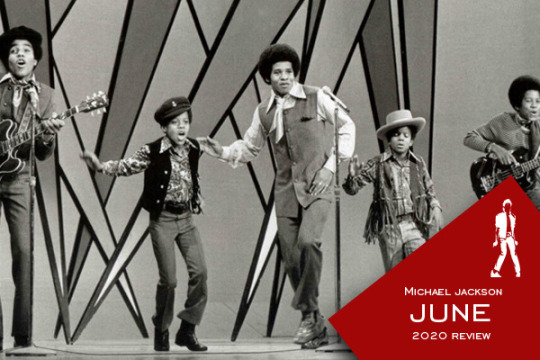
- It’s been over 50 years since the Jackson 5 performed on the Ed Sullivan show. As part of a full library upload, the performances are restored and uploaded to YouTube for future generations to enjoy. You can watch the iconic performances here!
- Sixteen11 Media Group announces the release of a new book titled, ‘The Story of HIStory’ by Pez Jax. The book charts the creation and release of HIStory and marks 25 years of the album’s release. Including interviews with many people who worked on the album and short films, Jax called upon HIStory Statue sculptor Diana Walczak to help create the cover of the book. By the end of 2020, the book was released in special gold hardback and has been shipped to over 30 countries around the world. Several of Michael’s items from the era were placed on auction through Julien’s Auctions. Taking place from the 15th – 19th of June, listings included the three Olodum outfits worn by Michael in ‘They Don’t Care About Us’, the black trench coat from Stranger In Moscow and the handwritten lyrics to D.S.

- Author Damien Shields releases ‘The Genesis of Thriller’, a special audio documentary that takes listeners into the studio to discover how the world’s biggest-selling album was made. HIGHLY Recommended!
You can listen to this insightful audio documentary here!
youtube
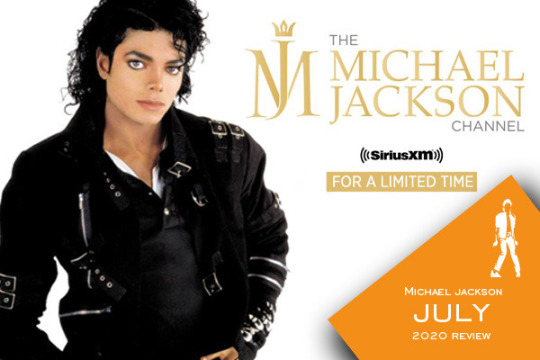
- SiriusXM launches ‘The Michael Jackson Channel’, a radio station playing nothing but Michael Jackson music for a strictly limited time. The station also featured a special playlist titled ‘The Now More Than Ever King of Pop Playlist’.

- UK Nationwide Radio Station ‘Smooth Radio’ host their annual ‘Top 100’ poll to find out who the number one Icon is, according to listeners. With an overwhelming number of votes, Michael comes in at Number one.

- Following global demonstrations in relation to the killing of George Floyd at the hands of police, Spike Lee teamed up with the Estate to release a new version of ‘They Don’t Care About Us’ for 2020. Mixing together both the Brazilian and Prison versions of the short film, Lee also incorporated footage from demonstrations around the world, which once again proved just how timeless Michael’s music is when used as the backdrop to current affairs.
Watch it here!
youtube
- Chinese fans celebrate Michael’s 62nd Birthday with the unveiling of 10 statues across the country. Created by MJJCN, the statues were installed in prominent locations including Nanning and Beijing and serve as a wonderful dedication to Michael.
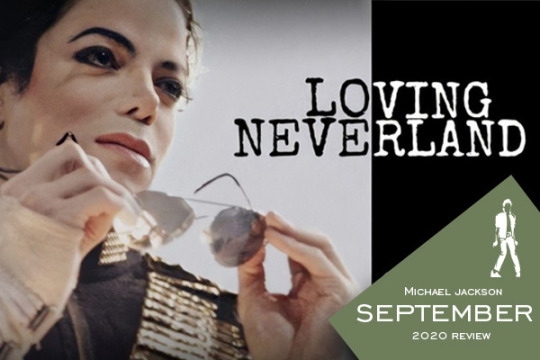
‘Loving Neverland’ is released on YouTube as a five-hour compilation of footage and information that details Michael’s life, challenges and career in great detail. Compiled by fans Nandita Raghav and Deboleena Aich, Loving Neverland serves as a powerful reminder to what Michael experienced for anyone looking to understand who he was. You can watch it here!
youtube
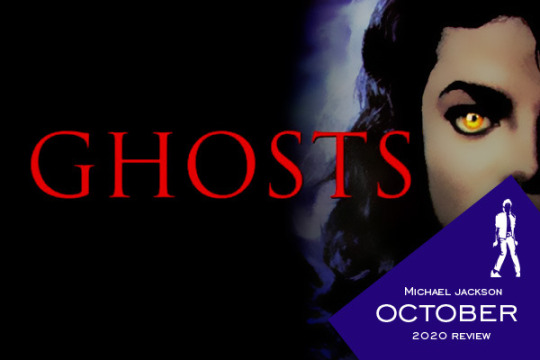
- Finally, and after many years of asking, the Estate decided to do something with Michael Jackson’s Ghosts, announcing it would be free to stream on YouTube from 29th October until the 1st of November. To mark the Halloween period, which Michael ultimately rules, the mini-movie was uploaded in better quality than the previous uploads.
- Walmart release a limited edition 2x colored vinyl of the Jackson 5 greatest hits album ‘The Ultimate Collection’. Available only in the U.S, the album was issued through Universal Music.

- In what’s almost yearly fashion, more of Michael’s personal items were placed up for auction including the 2006 Japan VMAs jacket that marked Michael’s first official red-carpet appearance since his 2005 trial.
Also on auction were platinum record awards, signed items, photographs, drawings and a glove.
- Cirque-Du-Soleil announced that despite being closed for most of 2020 due to the pandemic, Michael Jackson ONE is one of five Las Vegas residency shows to receive a contract extension. Originally signed as a 10-year with five years guaranteed at the Mandalay Bay, the show has been so popular that both Cirque and Mandalay want to keep it going past its 2023 end date. The new end date on the contract extension has not been announced.
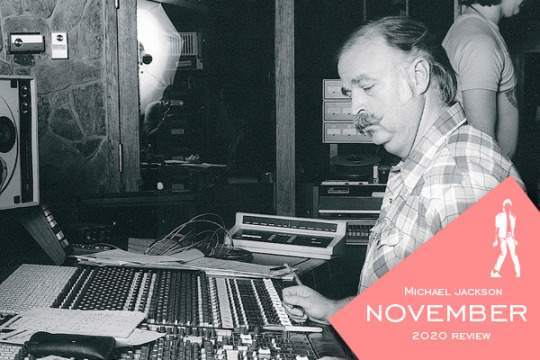
- On November 16th, the legendary Bruce Swedien passed away. Having worked with Michael as Engineer on all his Epic solo albums up to Invincible, Swedien continued working in the industry up until his passing and became an inspiration to many upcoming producers and engineers. Rest in Peace Bruce!
- Michael once again topped Forbes list of the Highest-Paid Dead Celebrity. Coming in at number one with $48 million earned, he beat Dr Seuss who came in second position with $33 million. FYI, Elvis came in 5th.

- To cap off another year of insightful interviews and important documentation, the MJCast episode 126 was a special featuring TJ Jackson. TJ speaks about growing up a Jackson, working with Michael and how the last few years of negativity have affected his family. You can listen to this deeply personal episode here!

- On Christmas Eve it was announced that Neverland ranch had officially been sold. Purchased for just $22 million by Billionaire Ron Burkle, the final price was a huge reduction from the overzealous $100 million asking price when the property was first put onto the market. However, there is hope as Burkle was a former business associate and friend to Michael, so while it may not be a ‘Michael Jackson Memorial’, it will hopefully be treated with the respect and history it deserves.
As we begin 2021 with hope and optimism, it may take a while before we can all be back with our favorite MJ friends; throwing down dance moves on his birthday and lighting candles on his anniversary. However, with the 30th Anniversary of Dangerous and the 20th Anniversary of Invincible at the tail end of the year, it’s likely we can look forward to some exciting coverage from a variety of different places and hopefully some more chart-topping achievements throughout the year.
⭐༺★༻ ༺🖤༻ ༺★༻⭐
2 notes
·
View notes
Text
Run the Jewels Album Review: RTJ4

(Jewel Runners/BMG)
BY JORDAN MAINZER
While artists throughout the spring and summer have last-minute changed their album release dates due to the COVID-19 pandemic, rap duo Run the Jewels rushed the release of their long-awaited RTJ4 in response to a different disease: police brutality and the systemic murders of black citizens. The execution of George Floyd at the hands of a racist police offer and three complicit onlookers was the boiling point for 400 years of the systematic oppression of black bodies, as across the world, they and non-black allies have protested and rioted to say, “No more.” Part of the perceived awakening among white society is that racism, which threatens the livelihood of people of color the world over, has always been prevalent and lethal and is only now being documented. Run the Jewels are here to say that not only has it always been happening, but until now, we haven’t been properly listening, if at all.
That is, as much as the targets of Killer Mike and El-P’s vitriol are cops, pseudo Christians, and the system, the two have some choice words for performative progressiveness. As such, it seems like the record could have been written on the spot, days ago. “Now I understand that woke folk be playin’ / Ain’t no revolution that’s televised and digitized,” Mike raps on “goonies vs. E.T.”, rejecting Gil Scott-Heron’s prescience to chide white people who would later go on to participate in #blackouttuesday and film themselves at protests only for social capital. But Mike doesn’t spit out of spite; he tells them they should care because they might be next. On “walking in the snow”, he and El channel Martin Niemöller’s “First they came for the Socialists” adage. “Funny fact about a cage, they’re never built for just one group,” El-P raps, referencing the U.S.’s treatment of immigrants at the border, one of many social ills to which better-off Americans are blissfully ignorant or only momentarily horrified until it affects them. Later in the track, Mike analyzes how the media exacerbates the situation: “They feed you fear for free / And you so numb, you watch the cops choke out a man like me / Until my voice goes from a shriek to whisper, “I can’t breathe,” the last line viscerally choked out with creaks, the sound of a last gasp. He continues, “But truly the travesty, you’ve been robbed of your empathy / Replaced it with apathy.” He cements the black rebellion we’ve seen the past few weeks as not just a reaction to a white supremacist society, but one that robs black folks of witnessing public black joy, and renders purportedly sympathetic white society desensitized to black pain.
Importantly, El-P’s production on RTJ4 rejects the dystopian, bass-heavy quality that normally characterizes all of his collaborations with Killer Mike, even pre-Run the Jewels. Instead, the album’s sound, from the beats to the features, is more rooted in black music classics, traditional and instant. They get Greg Nice and DJ Premier on the piano-laden “ooh la la” and Cutty Ranks on the slow-rolling dancehall stylings of “holy calamafuck”. “JU$T” juxtaposes a Pharrell Williams feature and Neptunes-style beats with Mike rapping in triplets, a nod to trends old and new. “pulling the pin” features a quintessentially soulful turn from none other than Mavis Staples; “There’s a grenade in my heart and the pin is in their palm,” she sings, simply, emphasizing her power to explode over someone else’s control. And then there’s “the ground below”, which cleverly samples Gang of Four’s “Ether”, a song about British soldiers torturing and Catholics in Northern Ireland, establishing a historical parallel, albeit an imperfect one.
The last moments of RTJ4, though, are appropriately solemn. “You ever notice that the worst of us have all the chips?” El-P asks on “a few words for the firing squad (radiation)”, over a melancholy, rolling drum beat. And Mike, as much as he’s been a vocal proponent of Bernie Sanders and sharing that Martin Luther King, Jr. chose to focus on income inequality initiatives towards the end of his life just as much as he did racial equality, raps, “It’d be a lie if I told you that I ever disdained the fortune and fame / But the presence of the pleasure never abstained me from any of the pain.” Cochemea Gastelum’s saxophone carries the track to the end, a somber illustration of the human condition. Life is hard enough as it is, and everyday pain exacerbates a society that doesn’t respect the existence of black folks. If that doesn’t wake you up, I don’t know what will.
youtube
#album review#run the jewels#bmg#cochemea gastelum#rtj4#jewel runners#covid-19#covid-19 panedmic#coronavirus#coronavirus pandemic#george floyd#killer mike#el-p#gil scott-heron#martin niemöller#greg nice#dj premier#cutty ranks#pharrell williams#pharrell#mavis staples#gang of four#the neptunes#bernie sanders#martin luther king jr.#rtj#george floyd protests#jewel runners/bmg#cochemea#covid
11 notes
·
View notes